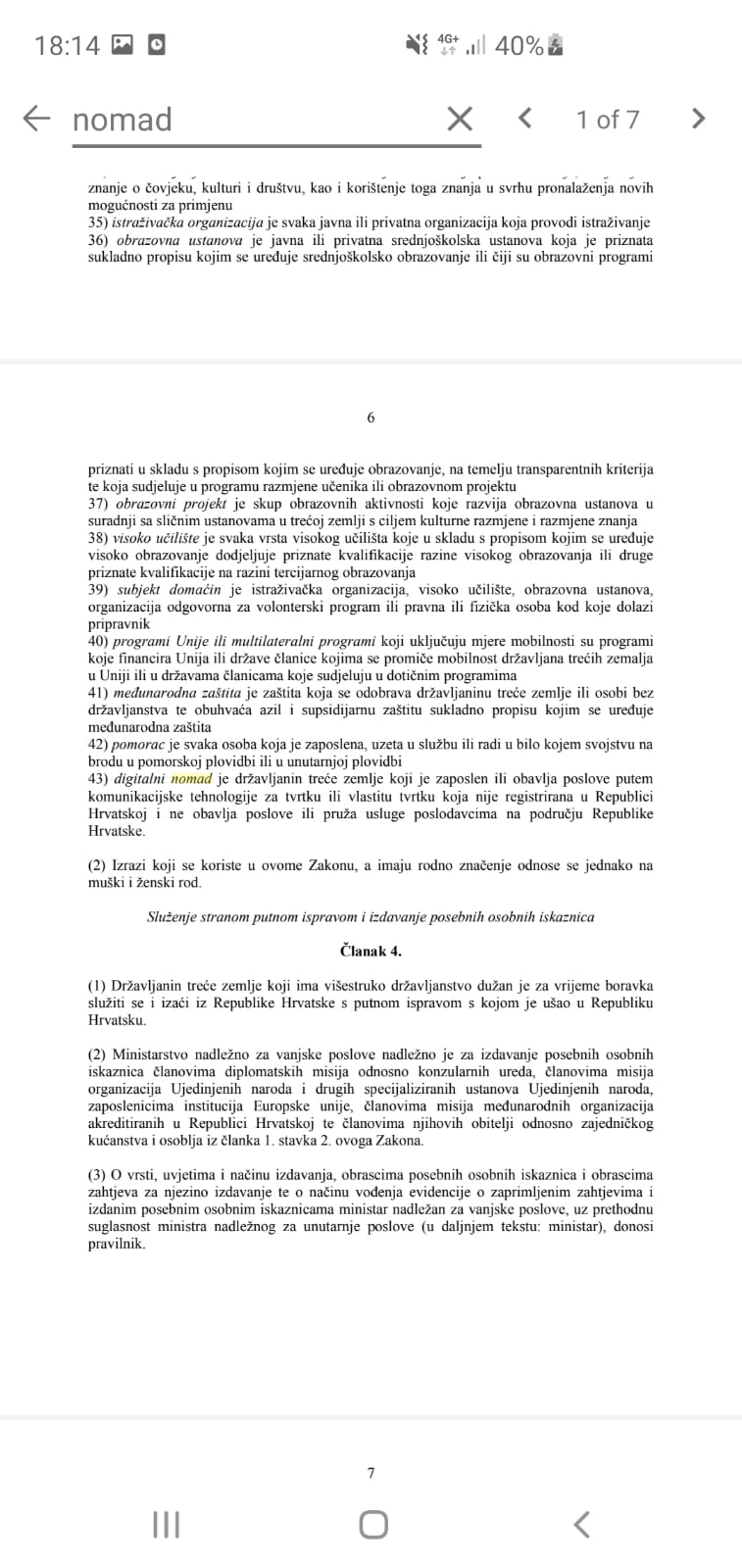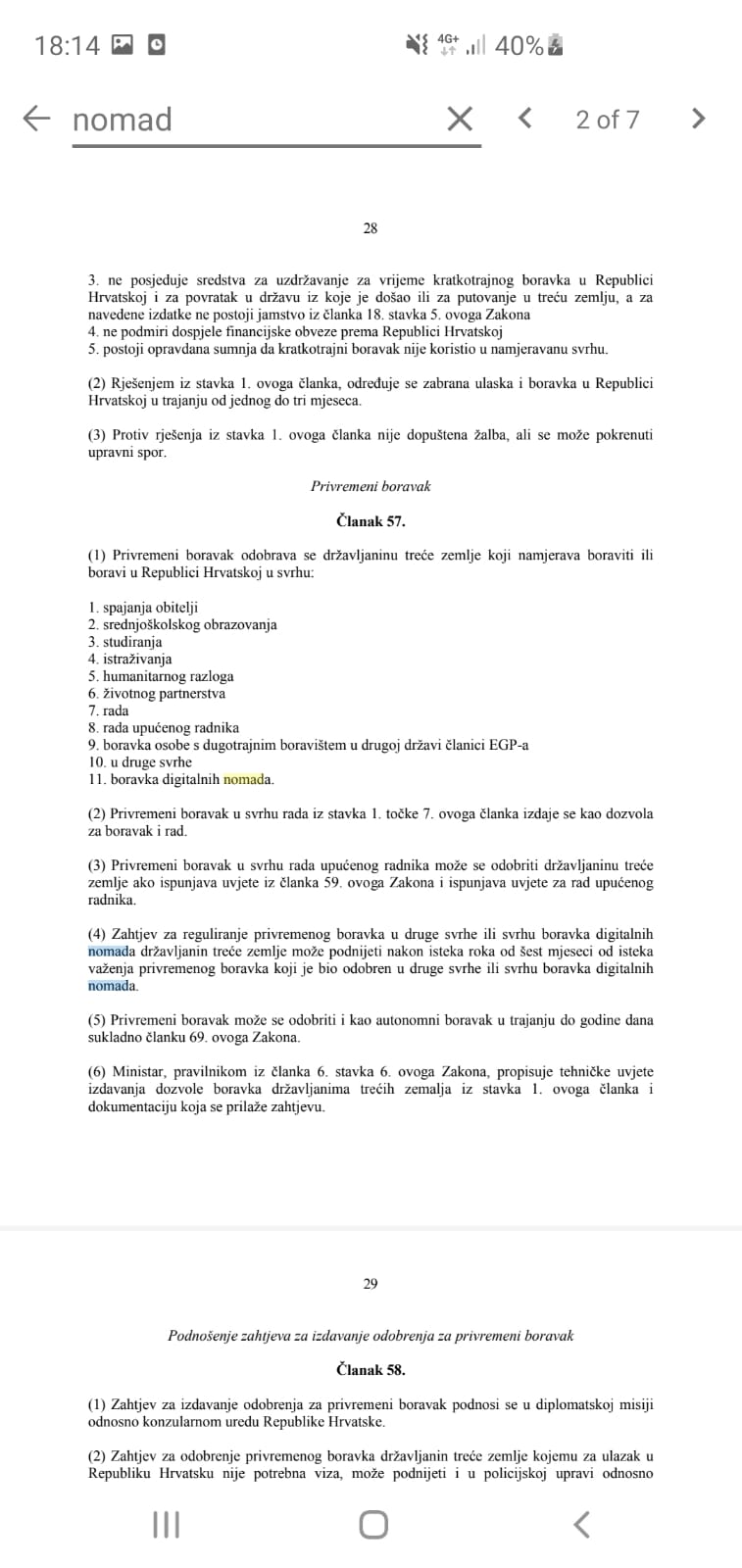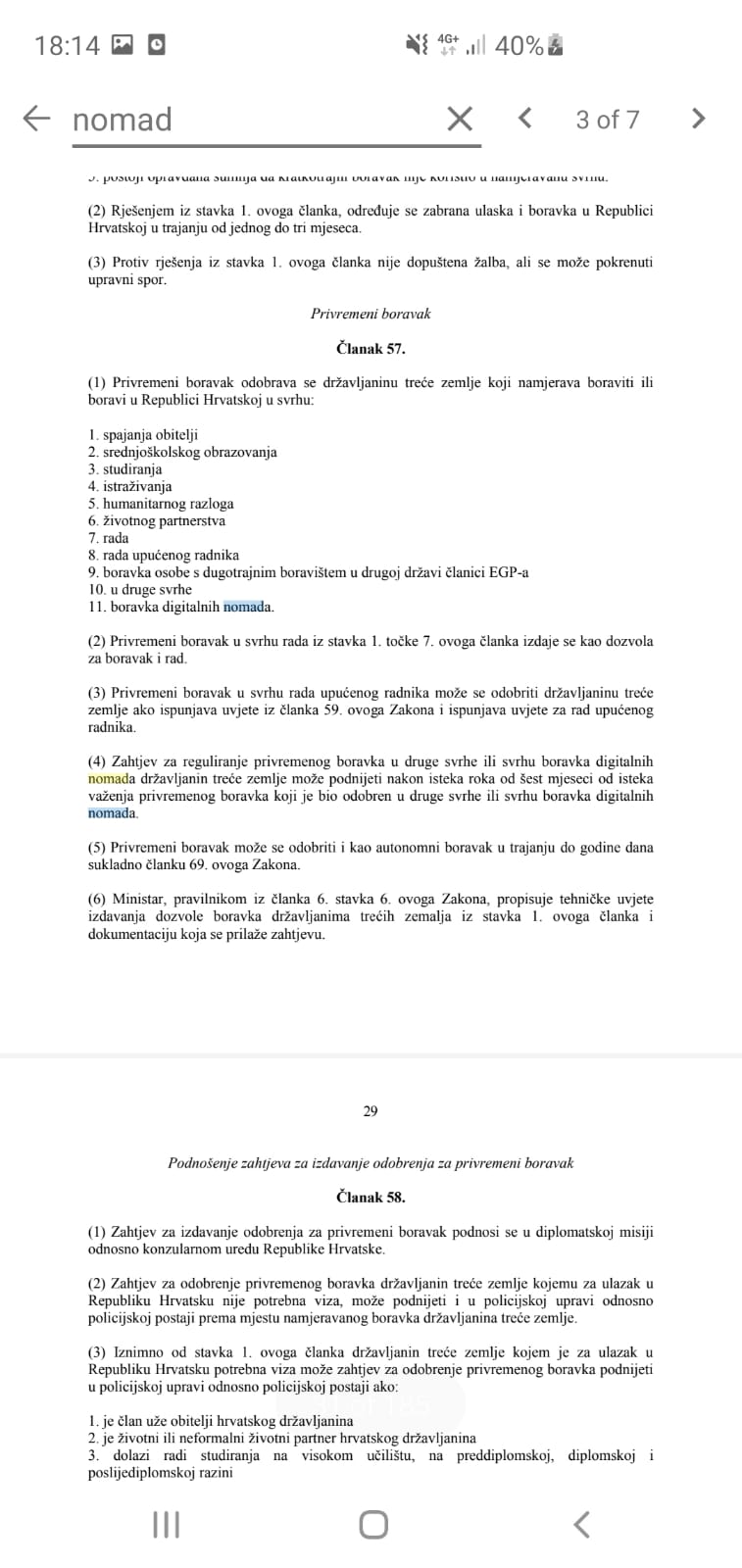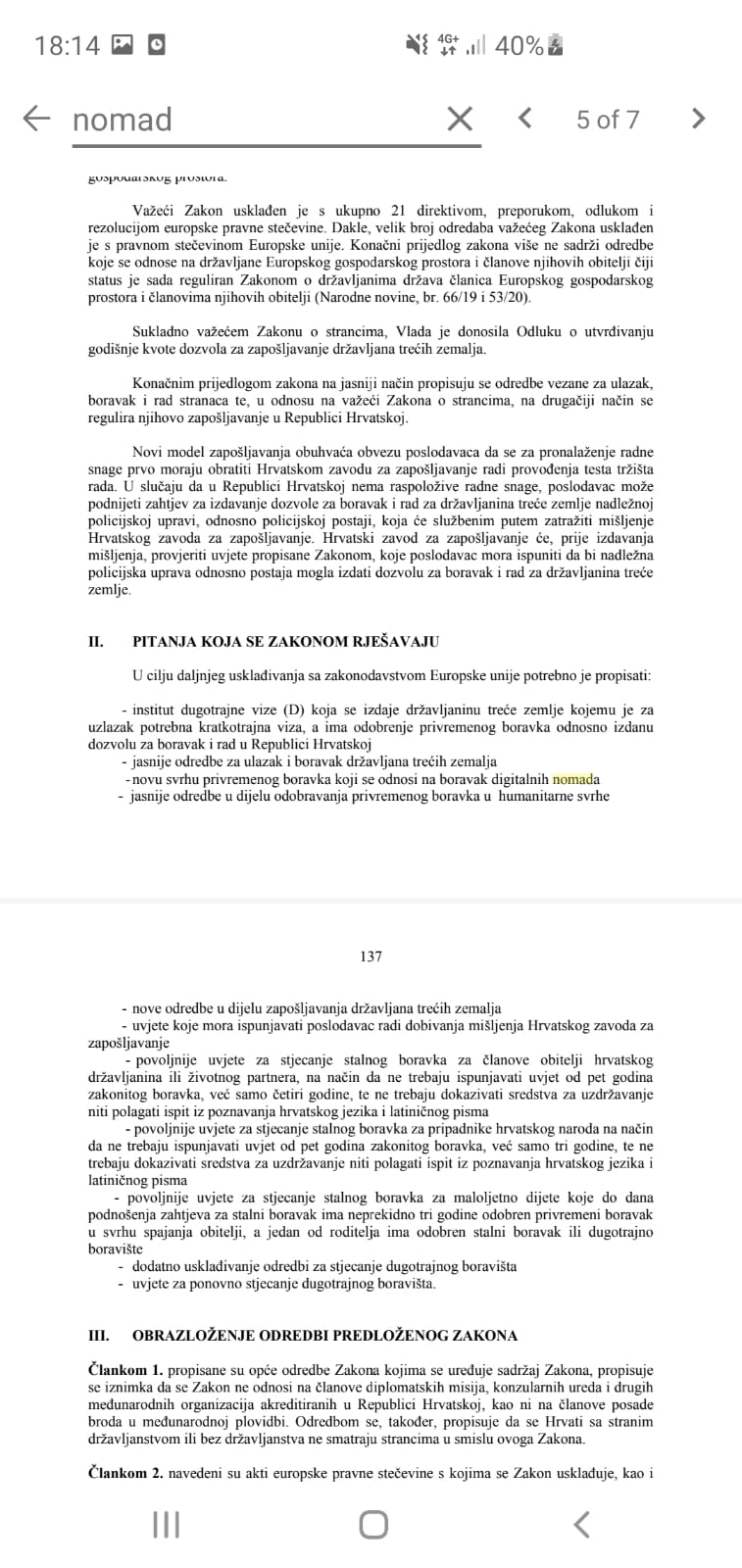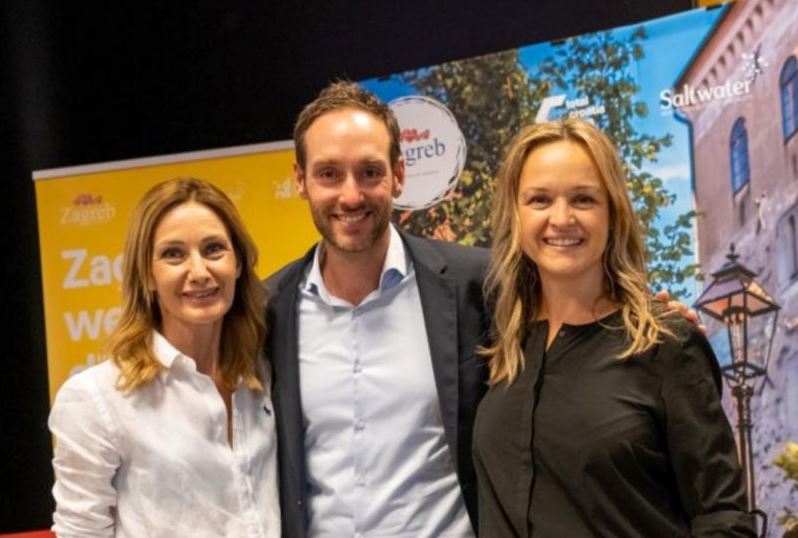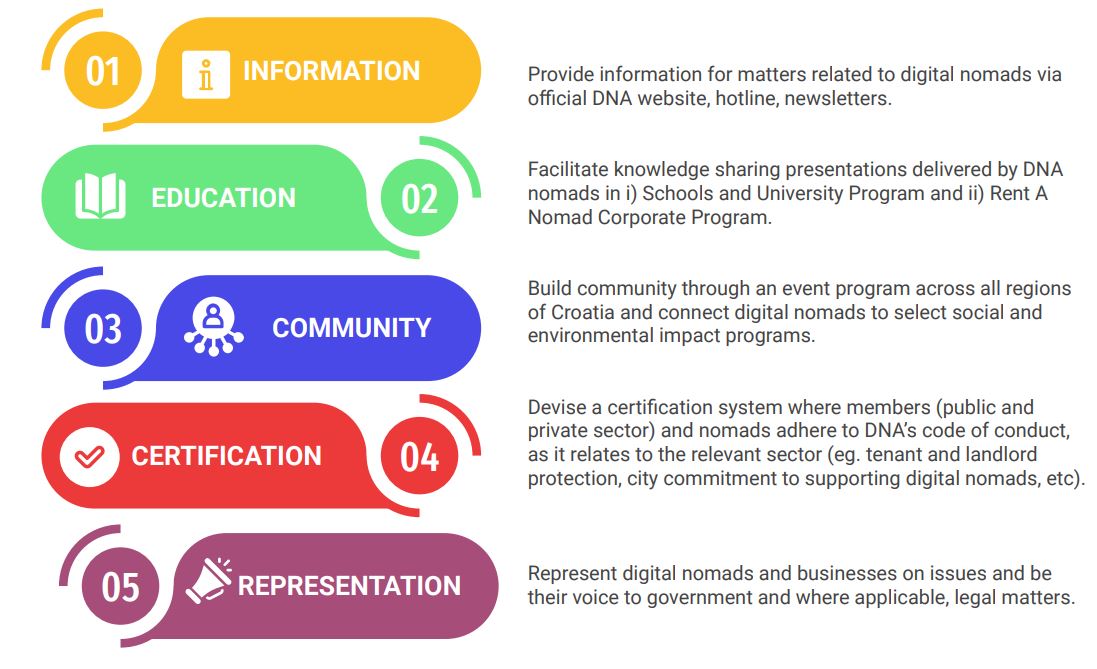Digital Nomads, a 2-Year Croatian Bureaucracy Success Story
Back in 2003, I bought a piece of real estate in Croatia which the lawyer insisted had clean papers. Nineteen years later, we are edging towards ownership.
Just over 2 years ago, an article quoting me in the Croatian media resulted in me getting sued. The next hearing is in November, and it will probably be another couple of years until the case is resolved.
Such is the nature and speed of Croatian bureaucracy. While these examples may seem extreme, they are by no means atypical. The wheels of Croatian bureaucracy tend to move slowly.
But then on occasion - incredibly, refreshingly - an example of Croatian efficiency appears that gives us a tantalising glimpse of how the future might look, and just how well Croatia could work with everyone pulling in the right direction.
I have been writing about the Croatian digital nomad opportunity for more than 3 years now since it first appeared as a strategy for Croatia at a conference, and as part of my suggested Branding Croatia for the Future: 5 Gifts and Trends to Focus On.
But the day Croatia's digital nomad journey really started to move celebrated its 2-year anniversary this week, the catalyst being an open letter on LinkedIn from Split-based Dutch entrepreneur, Jan de Jong, to Prime Minister Andrej Plenkovic on LinkedIn, asking for the introduction of a digital nomad visa Croatia.
What happened next was really quite astounding, at least to this long-term resident of a country where bureaucracy is king. Less than 6 months after that open letter, de Jong not only had met with the Prime Minister, but also worked with 5 ministries on the details, with the end result that on January 1, 2021 Croatia introduced its digital nomad permit, only the second of its kind in Europe after Estonia. Having introduced Jan to the digital nomad concept, he kept me closely informed of progress over those months (and which we reported step by step on TCN), and the determination of Jan and those around him, coupled with the willingness of public officials to push this forward was a joy to report on.
It also made one wonder that if it was possible to go from LinkedIn open letter to changing the Aliens Act and tax code and introduce a new permit in less than 6 months, what else could be achieved if the people who run this country put their minds to it? And if Croatian bureaucracy could be solved for a case like this, what would it take to make the digital nomad bureaucratic road map a standard for the rest of Croatian bureaucracy?
But that is a discussion for another time.
The last two years have seen immense progress for Croatia in what is perhaps one of the biggest potential growth areas for tourism in this country. Remote work is perhaps not a classic tourism sector, but as the world changes and we look for more sustainable solutions beyond beach overtourism in the peak season, the rise of the workation is showing no signs of slowing down. A cursory summary of the needs of this new tourism niche shows that Croatia is in pole position to take advantage - Lifestyle: NomadList Shows Why Croatia Most-Liked Remote Work Destination in Europe.
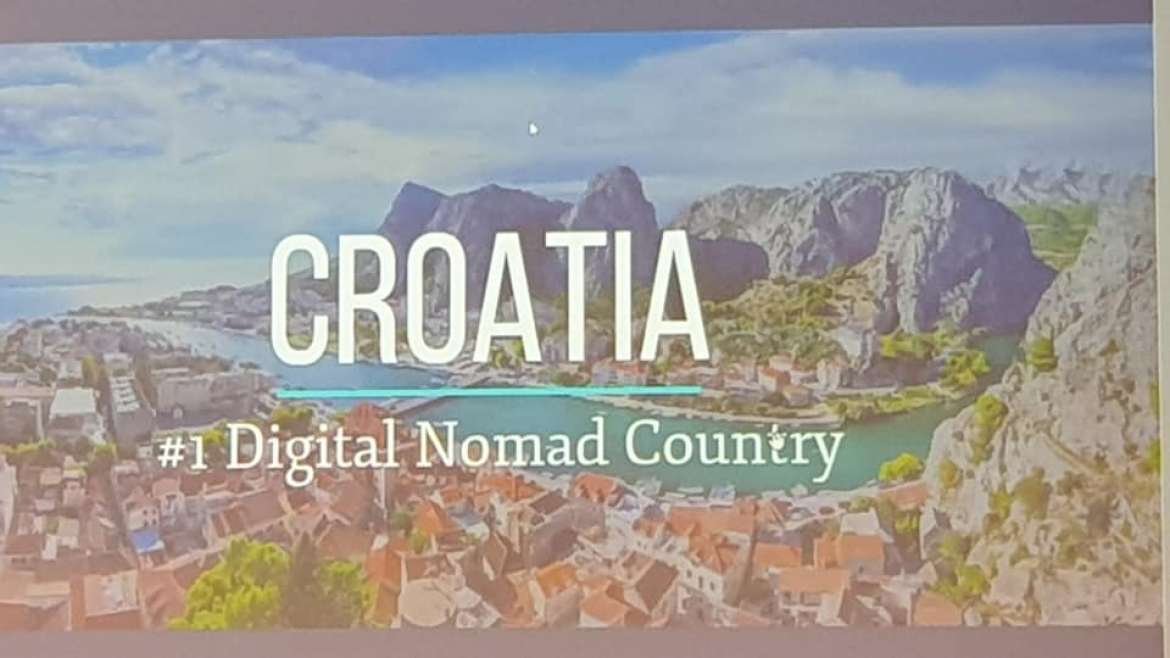
What happened next was a little unexpected. Just 5 months after Jan's post, the first claim by an industry insider that Croatia had the potential to become the world's number one digital nomad community was made at the first-ever dedicated digital nomad conference in Croatia in October, 2020 - Dubrovnik for Digital Nomads, organised by Saltwater Nomads, Dubrovnik Tourist Board, the City of Dubrovnik, and TCN. The claim, by Travel Off Path's Kashlee Kucheran, certainly helped Croatia's pioneers with encouragement and belief.
Kashlee may have been early, but she was not alone, with Croatia featuring as the second most-liked destination for nomads in the influential NomadList 2021 AND 2022 surveys. And there was more good news below the headlines, with Zagreb featuring in the 5th most-liked destinations in the world (and number 1 in Europe), as well as the fastest-growing remote work hun in Europe over the last five years.
An absolute key to Croatia's success has been the excellent public-private partnership on so many levels, a partnership that is often commented on by visiting nomads, as such a thing hardly exists in other countries. Most of the initiatives have come from the private sector, but they have been enthusiastically embraced by the public sector, with the digital nomad permit being a great example.
But there have also been excellent collaborations at the regional level, and the award-winning Zagreb Digital Nomad Week (Saltwater Nomads, TCN and Zagreb Tourist Board) and Dubrovnik Digital Nomads-in-Residence (Saltwater, TCN, City of Dubrovnik, Dubrovnik Tourist Board) are among several projects that have really helped lift Croatia's global visibility.
So too the formation of the world's first-ever Digital Nomad Association, DNA Croatia, which was founded by de Jong, Saltwater's Tanja Polegubic, and Karmela Tancabel, and really pushed forward by its first director, Michael Freer, to build an umbrella and a community to serve and advocate for the needs of the incoming digital nomads. DNA Croatia has also inspired similar associations in other countries. It is fair to say that Croatia has definitely arrived as a global voice in the remote world, something that was in evidence in the rich lineup of international participants at this year's Dubrovnik Work. Place. Culture. conference.
DNA Croatia has also signed a partnership with the Croatian National Tourist Board, which is excellent news, allowing the public and private institutions dedicated to developing this sector to work in tandem.
And the community is growing and becoming more integrated. A very nice eco-system is developing, and the mindset is slowly starting to dripfeed into Croatian society. With emigration often the number one priority for Croatian youth in search of opportunity, the arrival of a growing number of successful and happy international workers, who are choosing Croatia for its lifestyle and opportunity is giving pause for thought.
It has been an incredible two years of positive change and great energy. The power of a social media post, public-private partnership, and community to effect change. A lot has been achieved in just two years. Fasten your seatbelts, as the next two years promises to be even more exciting.
For more news and features on digital nomads in Croatia, follow the dedicated TCN section.
Jan de Jong on Nomads, Visas & Dubrovnik 'Work. Place. Culture." Conference
March 29, 2022 - A lot has happened in Croatia over the last 2 years in the Croatian digital nomad story. Ahead of the new Work. Place. Culture. conference in Dubrovnik, TCN catches up with one of the instigators of change - Split-based entrepreneur, Jan de Jong.
A busy season for Croatia's digital nomad story is about to begin. Last year's highlights included the introduction of the digital nomad permit on January 1, 2021, and destinations such as Zagreb and Dubrovnik attracted global interest with award-winning events such as Zagreb Digital Nomad Week and Dubrovnik Nomads-in-Residence project.
Both Zagreb and Dubrovnik will continue their push to position themselves in the market in 2022, with Zagreb Digital Nomad Week 2022 set to take place in June, and a new conference before that in Dubrovnik, as previously reported on TCN - Work. Place. Culture.
No self-respecting nomad conference would be complete without the participation of the nation's favourite Dutchman, Jan de Jong, whose pioneering efforts in instigating the nomad permit, as well as the co-founding of the Digital Nomad Association Croatia have been key to Croatia's rapid rise as a popular nomad destination. In the first of a series of interviews ahead of the conference, TCN caught up with Jan to reflect on a crazy couple of years, as well as looking forward to what is coming next.
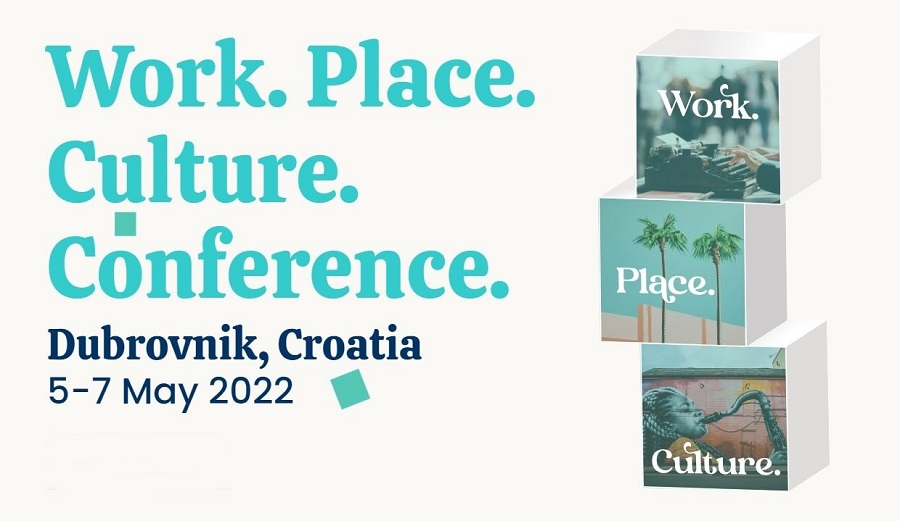
1. Two years ago, the term 'digital nomad' was almost unheard of in Croatia, and today Croatia is one of the most cited countries in Europe on the topic. As the initiator of the Croatian digital nomad permit (only the second in Europe) and co-founder of the Digital Nomad Association Croatia, you have played a significant role in that. Reflect on that journey briefly for us.
Over the past 15 years that I have lived in Croatia, I have started several businesses and initiatives. I have to admit that even building a big business doesn’t give me the same fulfillment and satisfaction as I am getting from what we are doing by putting Croatia on the world map as a digital nomad hotspot. It’s a joy to be surrounded by amazing people with different backgrounds who all want to turn Croatia into their temporary home. I strongly believe that our efforts can help turn Croatia into a more sustainable, year-round destination and that the young and smart remote work professionals can leave a positive impact on our youngest generation in Croatia.
(With DNA Croatia co-founders, Karmela Tancabel and Tanja Polegubic)
2. While the visa/permit was a headline attraction, the reality is that few nomads (by definition) stay in the same place for a year, and the bigger challenge is to showcase Croatia as an attractive remote work destination for 1-6 months. You co-founded the world's first Digital Nomad Association, DNA Croatia. Tell us about that, and about the excellent work it has performed in recent months connecting initiatives and building community.
Together with my co-founders of DNA Croatia, Tanja & Karmela, we are making strong efforts daily to unite and serve digital nomads in Croatia. However, truth to be told, we can’t make the impact we want to make by ourselves. That’s why we were very excited to bring Michael Freer on board as the director of DNA Croatia last November. With Michael's experience and full-time dedication, we have been able to demonstrate what DNA Croatia is capable of doing. Michael spearheaded several national and international campaigns, including community-building initiatives with a team of 8 volunteers in 8 different cities/towns across Croatia and organizing and participating in conferences in London and The Hague – promoting Croatia abroad as a digital nomad welcoming destination. I am also very proud of the support we are offering to Ukrainian remote work professionals who wish to apply for the digital nomad permit. All in all, more and more stakeholders find their way to DNA Croatia, which means that we are slowly but surely becoming the kind of NGO we want to be, which is to be the “go-to” organization for the digital nomad eco-system in Croatia. Many more developments are about to take place, including the opening up our DNA Croatia contact center. We will make a phone number available for when digital nomads have any questions during their stay in Croatia. Soon more about this.
3. One of the comments I hear a lot from visiting nomads is the level of public-private partnership in Croatia, something that hardly exists elsewhere. You had to negotiate with 5 ministries for the permit, for example, the cities of Zagreb and Dubrovnik have been very supportive of nomad events such as Zagreb Digital Nomad Week and Dubrovnik Nomads-in-Residence, and DNA Croatia recently agreed a partnership with the Croatian National Tourist Board. Tell us about the importance of this in moving the Croatian story forward.
The first step is always to acknowledge either the problem, challenge and/or opportunity. If we as a country, region, city, but also as citizens - acknowledge that depending on strong seasonal tourism is a problem and that bringing digital nomads to Croatia – year-round, is an opportunity – only then we can get everybody on board in pursuing our goals. And none of the stakeholders can do this by themselves without support from the other stakeholders. If Croatia wants to become a top destination globally for remote work professionals, we will need to start collaboration between the government, municipalities, national, regional and local tourist boards, private sector – and I hope that DNA Croatia can have a coordinating role in all of this.
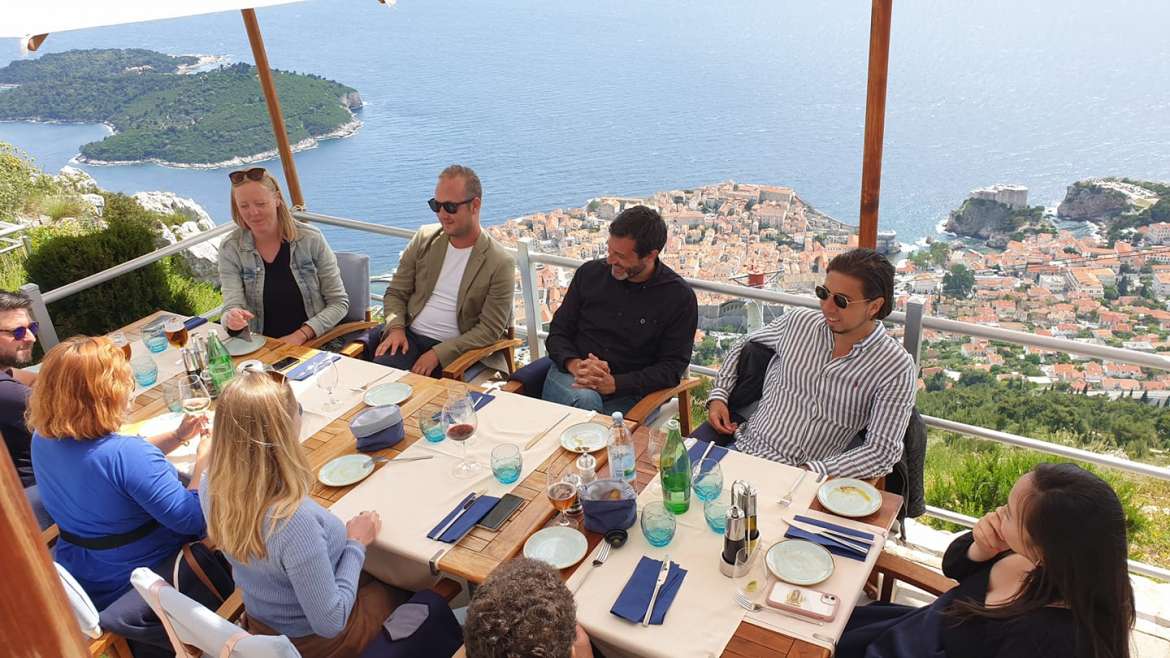
4. This is Croatia, and even though things are moving very quickly, it is impossible to please everyone. The permit is not perfect (although it was named the best in the world by one nomad portal), and several permit holders would like to extend their stay beyond the one-year maximum. How likely is that to happen, and what changes to the permit are being worked on?
Yes, there are several changes to the permit we would like to see in the future, including the possibility to renew the permit after 12 months and some changes to tax laws. Right now, digital nomads are exempt from paying income tax on the income they have as a digital nomad, however – officially taxes on other income, such as dividend, crypto gains, rental income, etc. are not exempt. Even though the Croatian tax authorities will most likely not go after such taxes, we would like to see this changed in the law.
The ministries are informed about our wish to see some of those additional changes, however – unfortunately I don’t expect to see any of such changes happen this year, simply because it is not high enough on the priority list.
5. You are heading once more to Dubrovnik on May 5-7 for the Work. Place. Culture. conference. The city has been at the forefront of Croatia's digital nomad revolution, hosting the first-ever digital nomad conference in Croatia, as well as the award-winning Dubrovnik Nomads-in-Residence program. Tell us a little about Dubrovnik's journey so far.
Dubrovnik was perhaps more than other cities suffering from mass tourism during the season. They were the first to acknowledge this problem and to acknowledge the opportunities that can come from hosting digital nomads year-round. And once you have a city and tourist board that understands this, you can accomplish anything you want, which is exactly what Dubrovnik is doing right now – by demonstrating real leadership when it comes to turning the city into a digital nomad welcoming destination. As a founding member of DNA Croatia, I can only say that I like what I am seeing in Dubrovnik and I hope that this serves as an example and inspiration to other cities and regions.
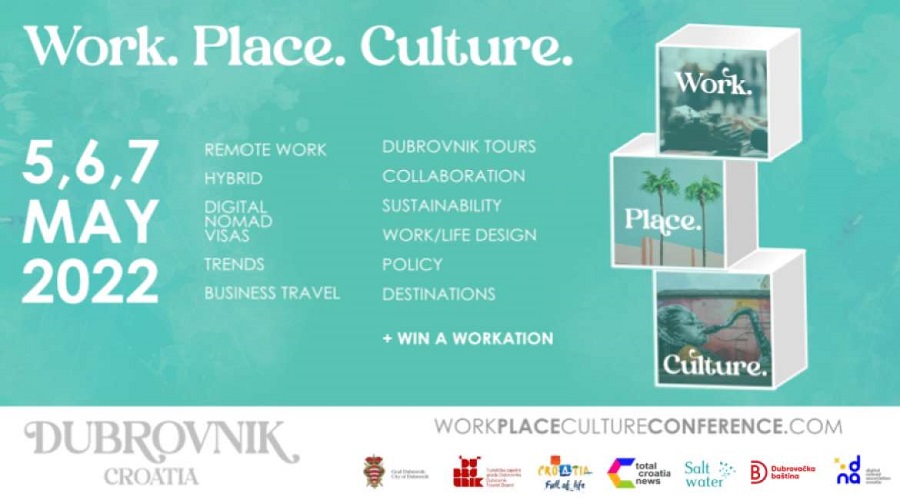
6. Who is the conference aimed at, why should people come, and what will be your role?
The targeted audience of this conference is not just digital nomads, but is actually more focused on the remote work professionals in general. I think there is also a lot to learn here for employers, because the way people live and work has significantly changed over the past few years. Before, we spoke a lot about work/life balance. Nowadays you more often hear about work/life integration. This is a new way of working, for both employees, freelancers and for employers. In my opinion, as a remote work professional and employer myself – I believe that the content of this conference couldn’t be more relevant.
7. Where would you like to see Croatia in 5 years in the remote workspace, and how do we get there?
I hope that in 5 years from now, when remote work professionals speak about “working from anywhere” – that they speak and think about Croatia as the place to be. Croatia should be known for being an affordable, authentic lifestyle destination – with all required infrastructure available for working remotely, including a thriving community.
How do we get there? Content, content, content!
- Content in terms of authentic experiences and things to do, 12 months a year.
- Content in terms of conferences aimed at digital nomads worldwide.
- Content in terms of user-generated blogs, vlogs, posts, stories, tweets – and local, regional and national promoted content
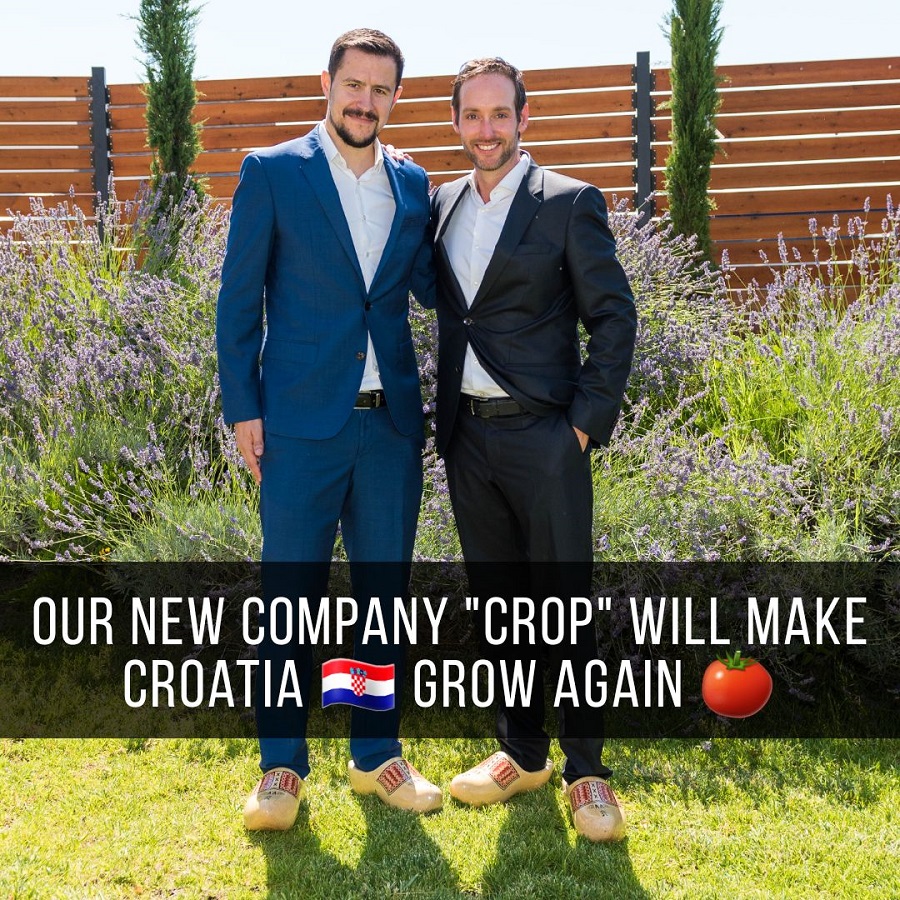
8. Although you are primarily known as the Croatian Nomad Visa Guy, this is actually only a small part of what you do. One of your current missions is to help revitalise Croatia's agriculture. Explain what you are trying to achieve, how it is going, and where people can follow the story.
Being a Dutch entrepreneur in Croatia, I wanted to be the bridge between the Netherlands and Croatia – in a way that I would like to bring more of the Dutch agriculture technology to my new home country. In the past, Croatia used to produce enough food to feed an entire region. Today, Croatia is a food importing nation. That is why, together with my friend Jerko Trogrlic, I co-founded the company CROP. It is our mission to make sure that Croatia becomes less dependent on importing food, and ultimately to help turn Croatia into a food exporting nation again, like it used to be.
Currently we are working hard, together with our Dutch partners, on developing the first project, which is a 6-hectare greenhouse for growing cherry tomatoes. With a strong focus on sustainability, we plan on using geothermal heat for heating our greenhouse and solar energy for our grow lights. An estimated investment of 18 - 20 million EURO, which would create some 60 new full-time jobs in an area that desperately needs new jobs.
You can follow Jan de Jong on LinkedIn.
For more information about Work. Place. Culture. in Dubrovnik from May 5-7, visit the official website.
For more news and features about digital nomads in Croatia, follow the dedicated TCN section.
Crop Company Wants to Invest 18 Million Euros into Croatia
November the 20th, 2021 - The agricultural technology Crop company published an ad on LinkedIn recently which they stated that they were on the hunt for land for the construction of the first high-tech greenhouse into which they plan to invest a massive 18 million euros, with the help of their Dutch partners, Dutch Greenhouses.
As Poslovni Dnevnik/Marija Crnjak writes, the Crop company was founded last year by entrepreneurs from the digital business and public relations, Jan de Jong and Jerko Trogrlic, known to the public for the project of promoting digital nomads and the digital nomad permit (often wrongly referred to as a visa) in Croatia.
The goal with the Crop company is to implement the latest Dutch technology for greenhouses, which enables the efficient achievement of high quality production with hydroponic cultivation, for both the domestic market and for exports.
As early as last year, they pointed out in public that they already had many potential investors who had showed some significant interest, and then they considered several locations, but apparently none have worked out for them so far.
"There is a lot of unused land across Croatia, but it isn't easy to find land that meets all the criteria, as each location has positive and negative sides. Together with our Dutch partner, Dutch Greenhouses, and their agricultural investment fund, we plan to invest 18 million euros in a greenhouse that will cover six hectares, and use the latest Dutch technology, including lamps for winter cultivation,'' they stated.
They also stated some more specific requirements for their investment in land - they need flat land with a total area of 12 hectares, of which 6 hectares will be intended for the construction of greenhouses, and the rest for a solar power plant, but they also need good infrastructure related to energy supply. Since they plan to employ about 70 people there, it is desirable that it be located next to a settlement of at least 5,000 inhabitants.
They would like to see their first greenhouse in continental Croatia, ie in the Bjelovar-Bilogora, Virovitica-Podravina, Brod-Posavina, Osijek-Baranja, Vukovar-Srijem, Pozega-Slavonia or Sisak-Moslavina counties.
For more, make sure to check out our dedicated business section.
Jan de Jong Introduces 4-Day Workweek for Webpower Adria Employees
August 26, 2021 - Dutch entrepreneur Jan de Jong, who lives and works in Croatia, has announced a four-day workweek for Webpower Adria employees from September, without reducing their salaries.
Jan de Jong announced the news on his LinkedIn profile yesterday.
"Webpower Adria just gave all of its employees a raise of 20%. No, not in money, but in free time. We are introducing a 4 day work week - for the same salary! ??
In addition to that - whether my colleagues will be working from home or from the office will be entirely their own decision. ??
We are all individuals, with different preferences. If we can do our work from anywhere, then who are we to say it needs to be done from the office. ?
I strongly believe in the powerful words of sir Richard Branson: "If you look after your staff, they will look after your customers."
Our team was super thrilled to hear we are starting our 4 day work week as of September.
Their next task is to agree among each other who is taking off on which day - because the show must go on. We will, of course, remain available to our dear clients 5 days a week.?
Introducing a 4 day work week aims to reduce stress and increase productivity - as many researches have shown would be the result.
Personally, I don't know any Croatian company that offers this - so we at Webpower Adria are proud to be among the first companies in #Croatia ?? to introduce the 4 day work week.
Wouldn't you like to work 4 days a week for the same salary?"
The Webpower CEO told Index.hr that his company has 9 employees, who mostly work from home. One employee works from Osijek, and another is in Rijeka.
"I specifically work from Split, while the rest of my team works from Zagreb. The average employee is 28 years old," he said.
When asked how he came up with the idea, he said that he was encouraged to do so by other countries.
"In countries like Iceland, they have conducted several experiments in recent years testing a four-day workweek, and according to these results, working 4 days a week would reduce stress and increase productivity. Also, it is widespread in the Netherlands to work less than 5 days. They love it," De Jong told Index, adding that he expects greater satisfaction from his employees, which should result in satisfied customers.
Index asked how his employees reacted when he told them the news.
"Oh, well, they were very excited when we told them that. They smiled with so much with happiness, and some even cried from happiness," he said.
As the owner, would Jan also work 4 days a week?
"For me as an entrepreneur, it works a little differently. Webpower Adria is not the only company I work for. Last year, I became a co-founder of CROP to build high-tech greenhouses for growing tomatoes in Croatia. I am also a co-founder of Digital Nomads Croatia, where our mission is to unite and support digital nomads coming to Croatia. None of these businesses or activities require my involvement 40 hours a week, but when it all adds up, I end up working five days a week,” De Jong told Index.
When asked what he expects from a four-day workweek, he said this is a novelty, just as work from home was last year with the pandemic.
“I believe that once we show that working 4 days a week makes employees happy, that they are under less stress, that they are also more productive, I believe that then more and more companies will follow suit,” he added.
He added that he started thinking about making this decision before the summer.
"Before making a decision, we researched how busy our employees are at the moment, to see if a four-day workweek would have a negative impact on how we work. We concluded that we could really introduce a four-day workweek, and we are very excited about this new chapter for our company," De Jong said.
Would the working hours be extended due to the four-day workweek?
“We stay to work 8 hours a day, but if it takes a few more hours, I believe it will be better for employees than working five days a week,” De Jong pointed out.
He also said that he expanded his team with two more colleagues last year.
"We did a great job with the #BuyCroatia campaign. For every 25 companies that would switch from services like MailChimp, or other foreign service providers, Webpower Adria would hire 1 full-time employee in Croatia. This campaign resulted in 50 new clients, which allowed us to hire two more employees," he said.
He believes that in the future, many companies could opt for a four-day workweek.
For more on business in Croatia, follow TCN's dedicated page.
Ahead of Zagreb Digital Nomad Week, Jan de Jong Interview on Croatia's Progress
June 7, 2021 - It has been a breathtaking year on the digital nomad scence in Croatia. As the Croatian capital gears up for Zagreb Digital Nomad Week 2021 & Zagreb Digital Nomad Ambassador Project, TCN catches up with the man who set the ball rolling with that open letter to the Prime Minister - Split-based Dutch entrepreneur, Jan de Jong.
1. It is almost 11 months since you wrote the famous open letter on LinkedIn to Prime Minister Andrej Plenkovic. What were your hopes and expectations back then, and how do you feel about the consequences of that letter?
When I wrote the open letter to our PM Plenkovic, I had zero expectations and really high hopes. Prior to my open letter, I had already tested the opinion of the general public about welcoming digital nomads to Croatia - through various LinkedIn posts. And the response was each time overwhelming. So, I expected a lot of support for my open letter, but that we would actually change the laws in Croatia, within such a short time period – was something I could only dream of.
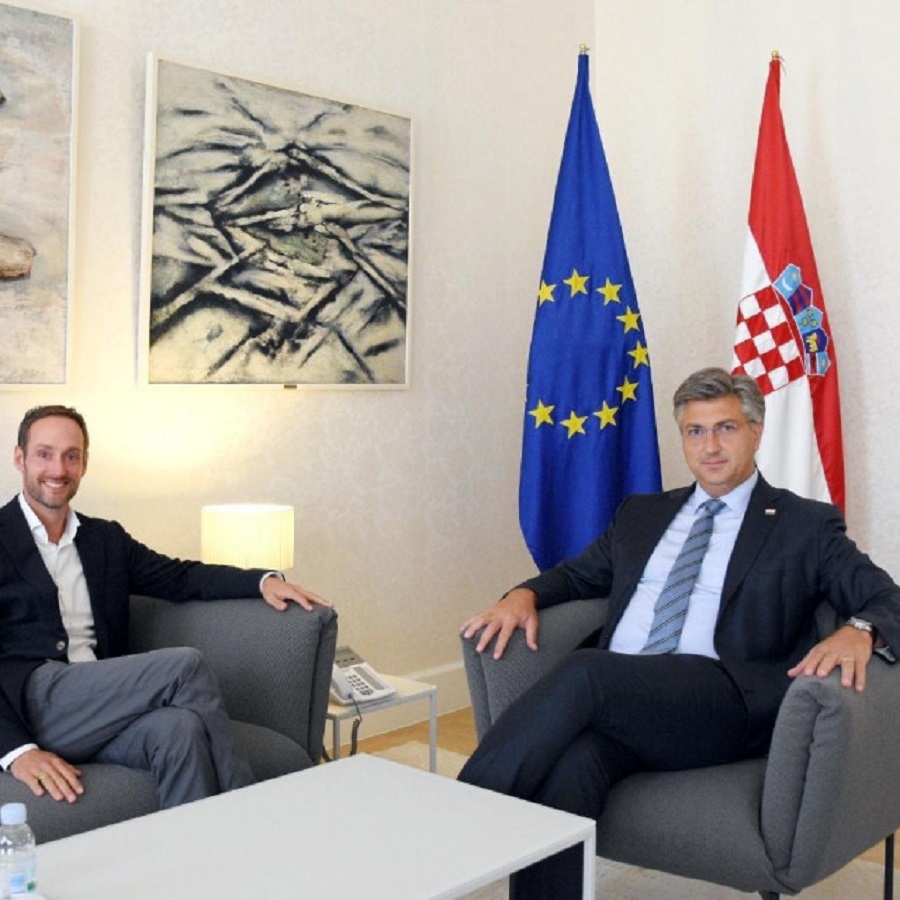
2. It has been an action-packed 11 months. Can you give us three high points from the journey?
The 3 high points were definitely the invitation to meet with the Ministry of Interior, as this was the first confirmation that my request for introducing a digital nomad visa was heard. The second high point was my meeting with the Prime Minister, when he shared his support for this initiative. The third high point was January 1st, 2021 – when the laws became active and when the first digital nomad got approved her staying permit soon after.
3. Along with Tanja Polegubic of Saltwater Nomads and Karmela Tancabel, you are a co-founder of Digital Nomad Association Croatia, with a website going live next week. Tell us a little about DNA Croatia - why did you found it, what is its purpose, and who is it aimed at?
The moment we knew that Croatia was going to be among the first countries in the world to welcome digital nomads, we decided that we wanted to have a more coordinated approach to supporting and uniting digital nomads in Croatia. This is not a job for one man/woman, so we wanted to start an association where other people can get involved in pursuing our mission. There are several stake-holders in all this: 1) The digital nomads. 2) Companies and individuals who wish to serve digital nomads and last but not least – we want to be the bridge between the digital nomad eco-system and the Croatian government.
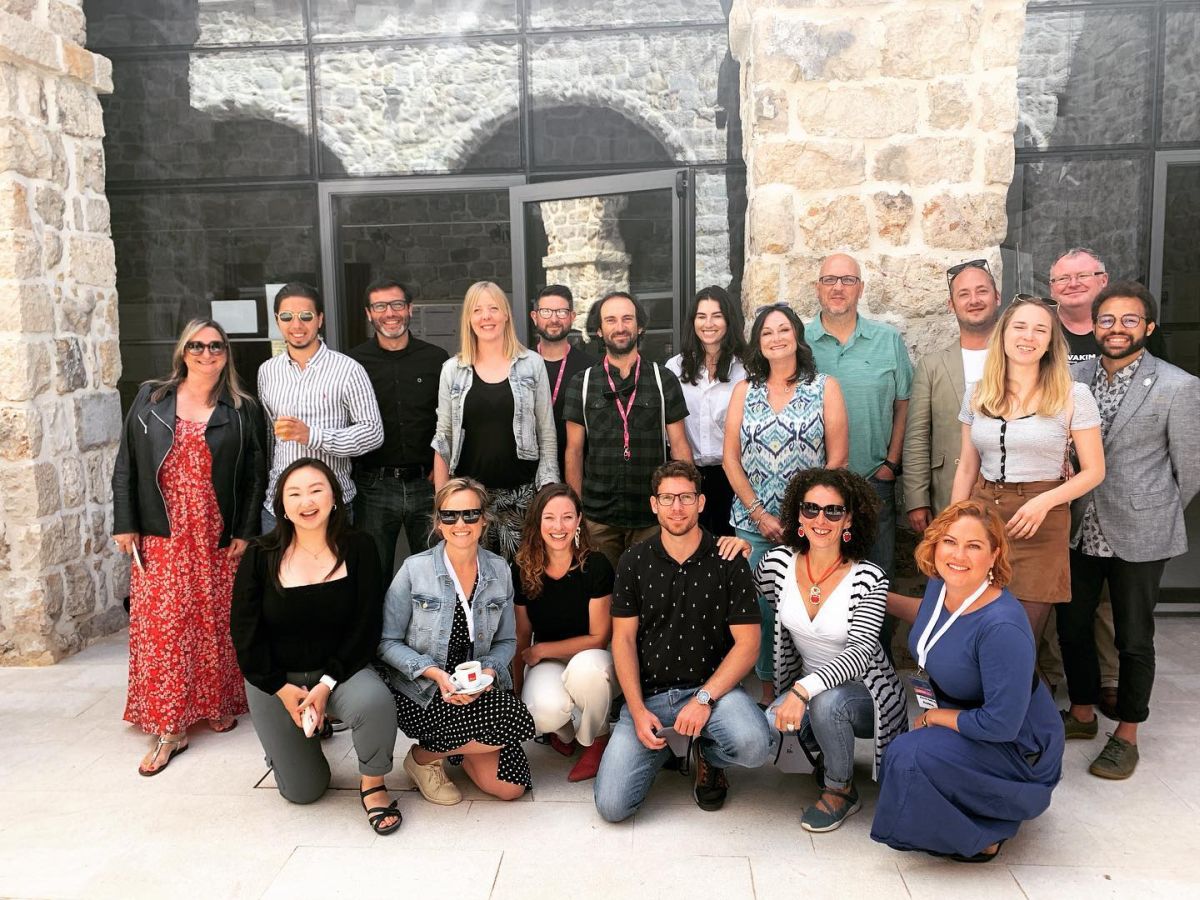
4. You are just back from Dubrovnik, where DNA took part in the final day of Dubrovnik Digital Nomads-in-Residence, which was organised by the City of Dubrovnik, Dubrovnik Tourist Board, Saltwater Nomads and TCN. Tell us a little about the energy down there, and what Dubrovnik learned from its 10 nomadic residents.
Aside from a stunning location, amazing weather and great people, to me it feels that this event is a gathering of lots of positivity and optimism – something we can definitely use in Croatia. At an event like this, we don’t talk about the challenges we are facing in Croatia or about what could have been done better. We talk about opportunities and what needs to be done in order to fully utilize our potential of becoming Europe’s hot spot for digital nomads.
The DNiR program was a co-creation event between digital nomads and local government/tourist board. Together, they came up with a 4-A strategy: Attract, Accommodate, Amaze & Amplify.
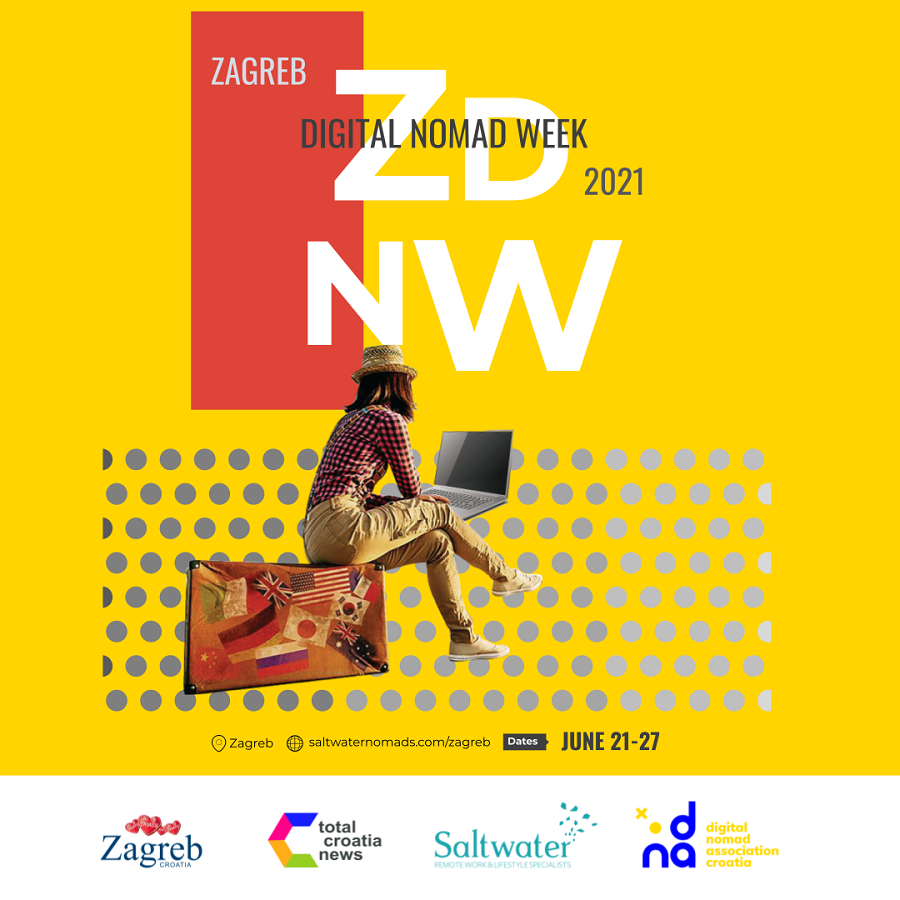
5. The focus now shifts to Zagreb, with DNA, TCN, Saltwater Nomads and the Zagreb Tourist Board hosting Zagreb Digital Nomad Week 2021 & Zagreb Digital Nomad Ambassador Project. Tell us a little about that, and how you will be involved specifically.
The Dubrovnik Digital Nomads-in-Residence program had great energy, and I am delighted that this will be transferred to Zagreb, albeit with a very different concept. The concept is once again being framed and delivered by Saltwater Nomads, with media support from TCN and hosted and financed by the Zagreb Tourist Board. This project will have two distinct parts. From June 21, there will be Zagreb Digital Nomad Week, 7 themes over 7 days, in various locations all over the city. The key topics will be cyber security, online presence, tax & finance, wellbeing, the future of work, remote careers, and explore Zagreb.
The second part of the program will be the Zagreb Digital Nomad Ambassador Project, where six digital nomads will be guests of the city, one month at a time from July 1 to December 31. It will give us a chance to explore Zagreb as a digital nomad destinations through the seasons, with a view to learning and improving the city's offer.
From DNA Croatia we will be involved in a similar way as in Dubrovnik. For us its important having a chance to interact with digital nomads and all other stake-holders, including the Zagreb Tourist Board, our sponsors/donors – such as Hrvatski Telekom, Raiffeisen, KPMG.
Each event brings new discoveries. We are a young association in a country for which “digital nomad tourism” is a new phenomenon. The most important thing during every single event is to keep learning and introducing new ways on how we as DNA Croatia can support & unite digital nomads in Croatia.
6. A lot of the focus on digital nomads in Croatia has been on the coast. What are your thoughts on the potential of Zagreb for nomads? What does the capital do well, and what can it do better?
I believe there is no place in Croatia where the infrastructure for digital nomads is better than in Zagreb. It is the capital city of Croatia after all. What many people don’t know is that the tourism sector in Zagreb is bigger than that of the rest of this country. Many digital nomads that are in search of great urban lifestyle and communities with like-minded people will be attracted to come to Zagreb. Luckily, knowing that Croatia offers 12-months staying permits to digital nomads, there will be plenty of time to explore different part of Croatia.
7. What are the biggest challenges, in your opinion, in developing the digital nomad opportunity?
Building strong communities is and will be the biggest challenge. Digital nomads will come to Croatia for what this country has to offer. However, they will decide to stay here as long as possible if there is a community they can join. Co-living, co-working spaces, infrastructure – this can all be created by entrepreneurs making investments. Building a community will take lots of efforts…and more time.
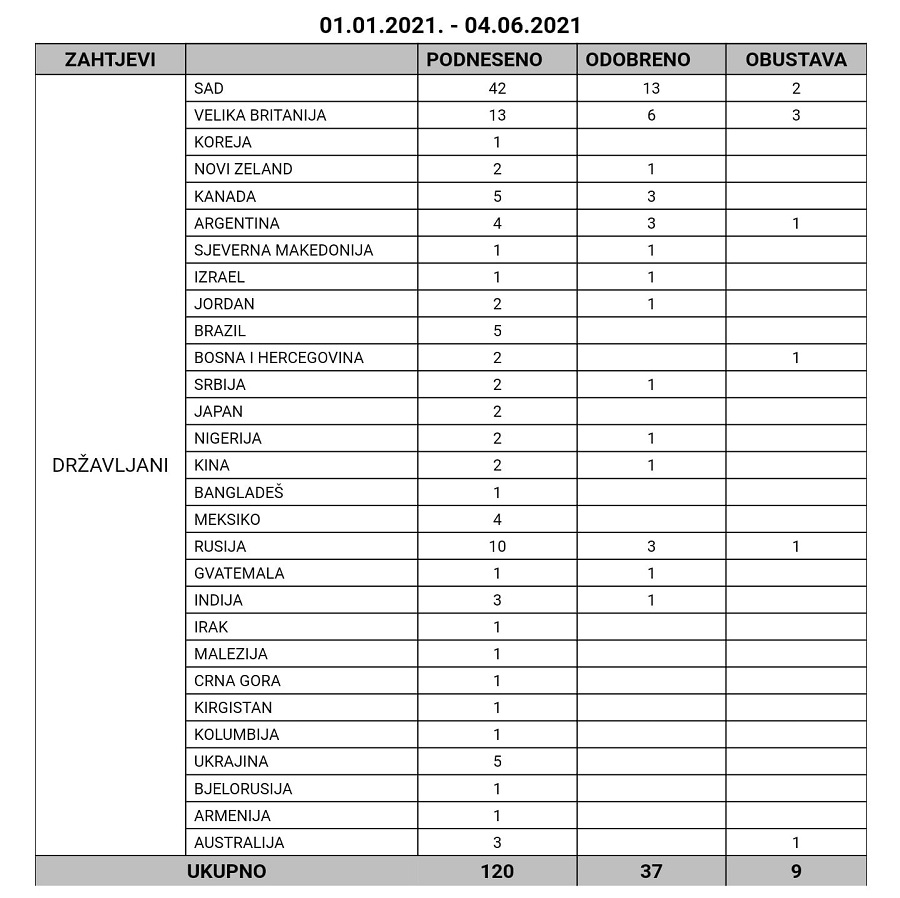
8. Regarding the visa, sorry permit, how many have applied so far, how many have been approved, and what level of applications do you expect once the borders fully open once more?
So far we have received 120 applications for 29 different countries. 37 applicants have been approved so far. The U.S. and U.K. digital nomads are taking a strong lead – making up for nearly half of all applications. Russians are also showing great interest, closely following the U.K.
On one hand I am happy we have the first 100+ applications. On the other hand, I was secretly hoping for more. Countries like Barbados, who did a great PR campaign right after launching their visa – got over 1.000 applications in the first month. So, compared to those results, we cannot be happy with 120 applications.
I personally believe that we as a country could have done more to promote our permit internationally. I am being told by the Ministry of Tourism and Croatian National Tourist Board that the digital nomad permit will get more attention from their side, in promoting it, after the tourism season ends.
Hopefully, around that time, it will also be easier to travel again, so we can see a rapid increase in number of applications in the second half of this year.
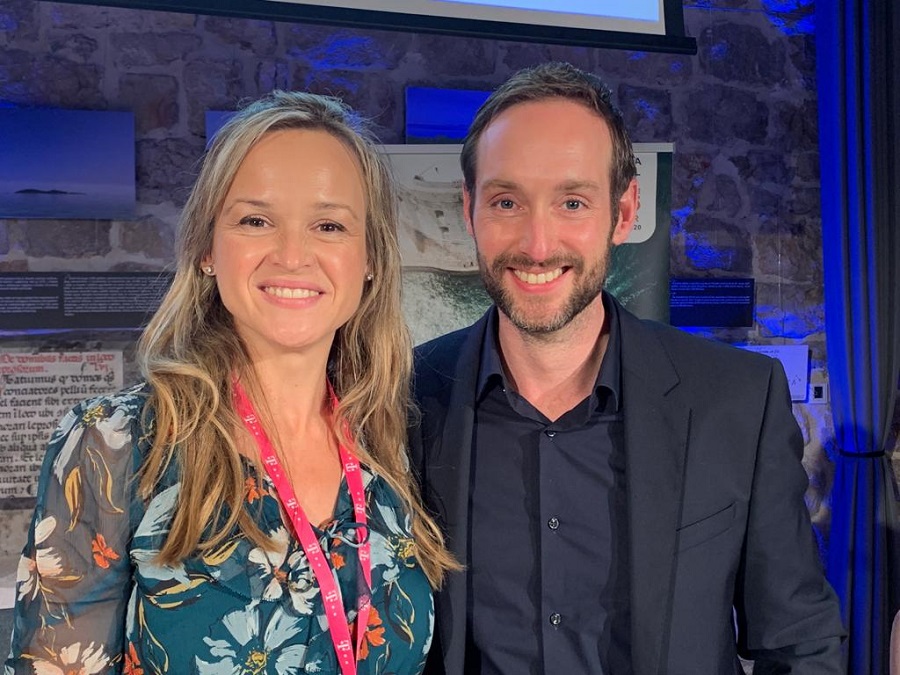
(Jan de Jong at the Dubrovnik for Digital Nomads conference in October 2020, with conference organiser Tanja Polegubic of Saltwater Nomads. Both are co-founders of the Digital Nomad Association Croatia)
9. Is the permit the finished article, or is it still a work in progress? The speed with which the whole processed was like driving a Rimac Nevera in the context of Croatian bureaucracy. Certain issues, such as the need for an apostille and the FBI background check proof, have caused some problems for some applicants. Are such issues open to being addressed?
The part that I am currently looking into are to make some additional legislative changes to the tax law. Currently, digital nomads are exempt from paying income tax in Croatia. We would however, like to see some additional clarity on digital nomads being exempt from paying taxes on other types of income, such as tax on capital gain, dividend tax, etc. Even though, the tax authorities stated that they would not go after such taxes, currently this is not defined by law. Together with KPMG we are looking into these open items, to make sure they are well defined.
Croatia will not waive from getting proof of no criminal record for applicants of the staying permit. Unfortunately, for some digital nomads, this is a time-consuming process to obtain such documentation, from i.e. the FBI. But if U.S. citizens who apply for the permit follow all necessary steps and take the time for their application, than I don’t see major obstacles here. This is not a problem of Croatian bureaucracy but more that of the U.S. bureaucracy.
Just to give you an example, as a Dutch citizen it would take me 30 minutes to get such proof of no criminal record at the city hall in the town where I would be registered. That is how its done in the Netherlands.
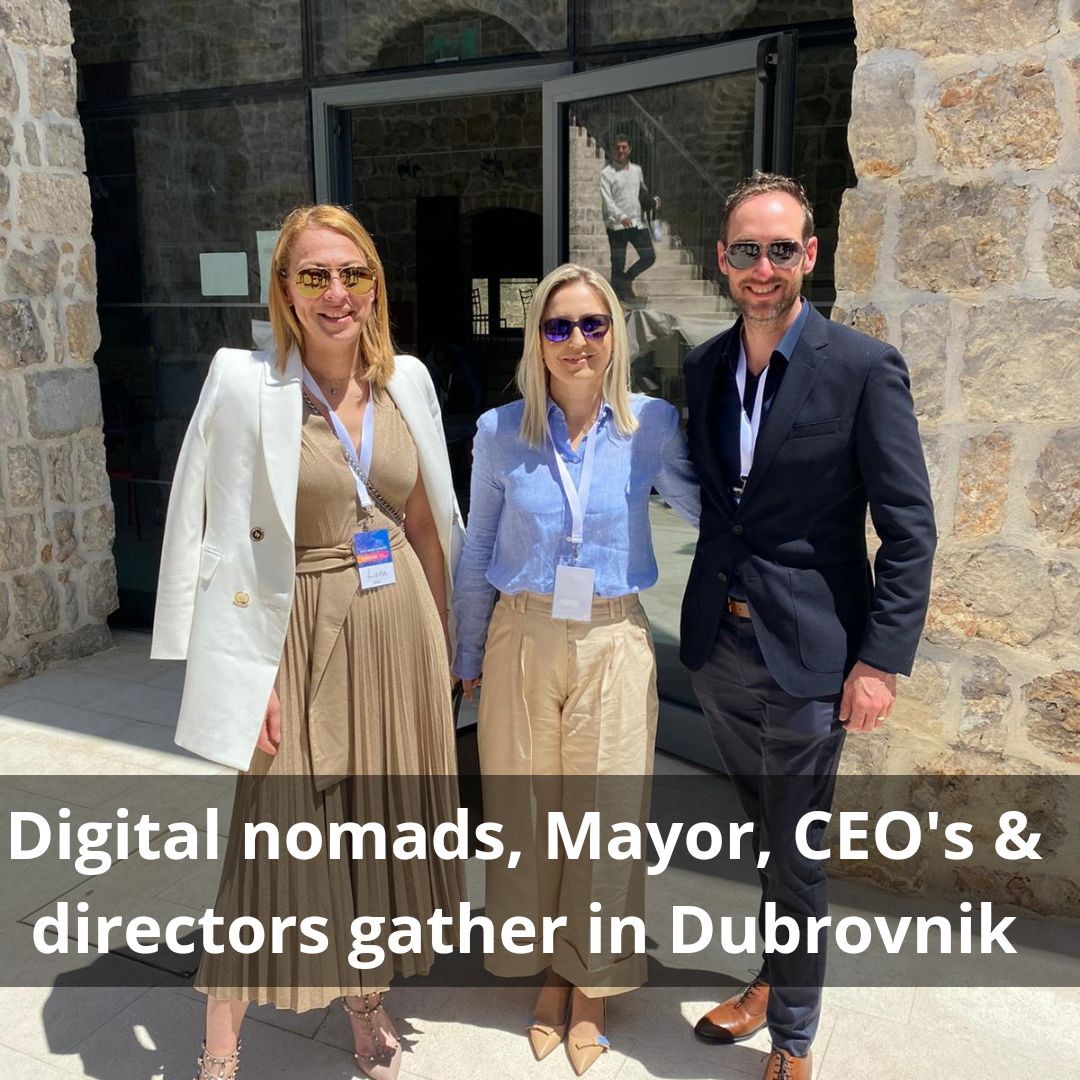
(De Jong with two of DNA's biggest corporate supporters - RBA Croatia CEO Liana Keseric, and KPDG's Kristina Grbavac - all three were panelists on the final day of Digital Nomads-in-Residence)
10. The support of private business has been excellent so far. Tell us more.
Yes, its great to see how some amazing Croatian companies have decided to support our efforts. And that in a very challenging year, where the Croatian economy was hurt severely as a result of Covid-19 and several major earthquakes. Hrvatski Telekom, Raiffeisen Bank, KPMG, Links, Younited Agency and several other companies have reached out – wanting to help and support. Hrvatski Telekom has already introduced a special proposition for digital nomads, offering unlimited, fast, mobile internet for just 60,00 kn per week – without contract obligation. It is great to see the largest telecom provider in Croatia demonstrating such leadership.
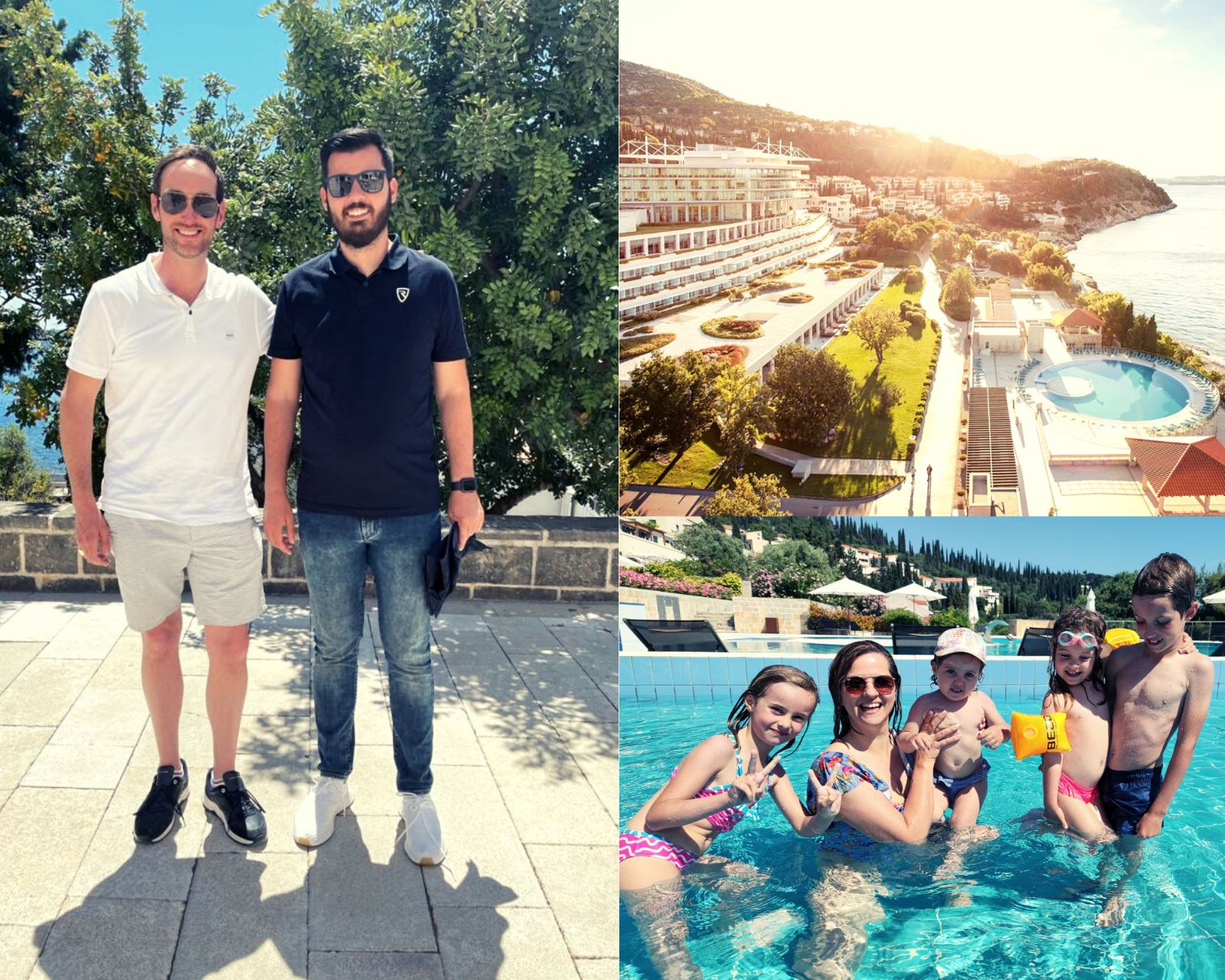
(Living the Croatian dream with and a meeting of the man who makes one very fast car)
11. And finally, what are the next steps for Croatia on its digital nomad journey?
For a change, we have the laws on our side in Croatia. The Croatian government did what it had to do to welcome digital nomads to come to Croatia. Now, we need to focus on building community, infrastructure and to promote Croatia internationally as a digital nomad hot spot in Europe. You know what they say – it takes 10 years to have overnight success. Right now, we are in year 1. I am super excited to see where we can take this in the coming decade. What it requires to turn this into a success is action today!
For more information on Zagreb Digital Nomad Week 2021 and Zagreb Digital Nomad Ambassador Project, visit the Saltwater Nomads website.
For the latest news and features on digital nomads in Croatia, follow the dedicated TCN section.
Split Digital Nomads Increasing Daily: ‘It’s Great Here, We Feel Safe’
May 12, 2021 - Split digital nomads are increasing daily thanks to the coastal city's quality offer, international community, and safety.
They come from all over the world, live with complete freedom of movement, work from home, a cafe, or a distant island. When choosing a location, the most important condition is a fast and quality internet connection, hospitality, and security. They are digital nomads, highly qualified foreigners, mostly IT experts, who are increasingly discovering Croatia as a unique piece of paradise on Earth, and Split seems ideal for their needs, reports Slobodna Dalmacija.
Thanks to amendments to the Aliens Act, Croatia has introduced the concept of digital nomads since the beginning of this year, who now have preferential tax treatment, which facilitates their decision to choose Croatia as their place of residence and work.
They can stay in Croatia for up to a year. The introduction of digital visas for digital nomads was initiated by entrepreneur Jan de Jong, a Dutchman who lives and works in Split. More and more people work remotely, and he sees this as an opportunity for the Croatian economy.
He is the co-founder of the Croatian Digital Nomads Association (DNA) with Tanja Polegubić, a returnee from Australia who has also been living and working in Split for several years. The association's main goals are to provide general information to digital nomads about life and work in Croatia, educate, connect digital nomads with service providers, and present their problems to the authorities.
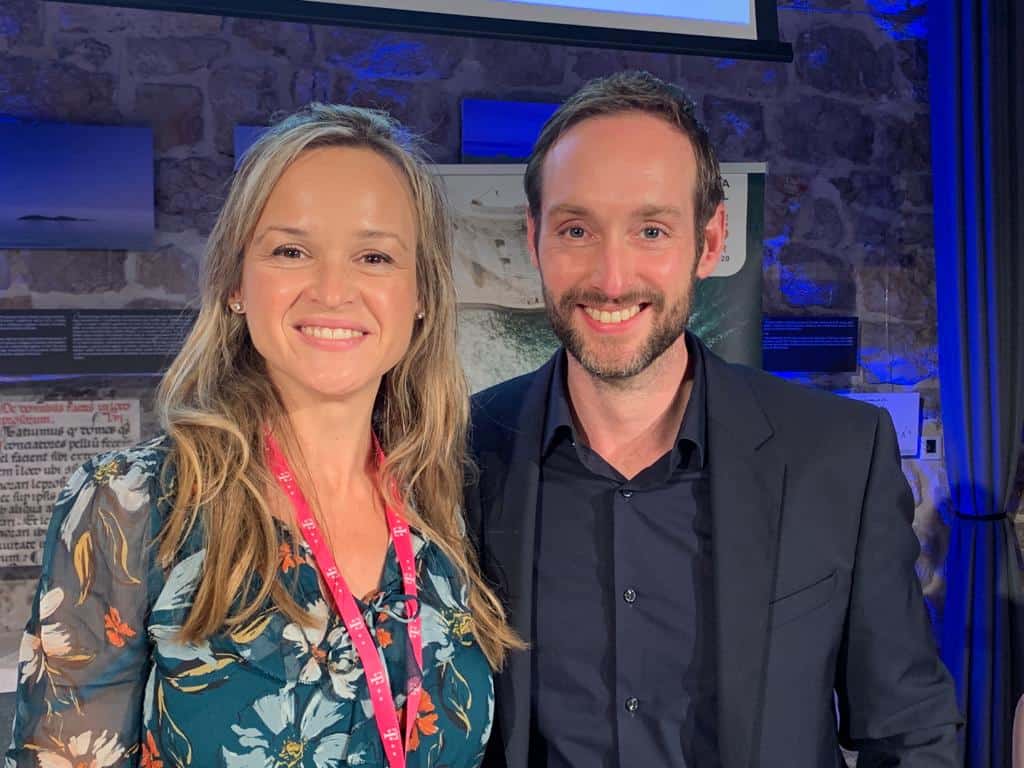
"Split is already a natural choice for many digital nomads, just like other cities on the coast. But that could change if some changes don’t happen, that is, if the city doesn’t open up to digital nomads. When I was looking for a coworking space to work in 2015, I searched the entire Adriatic coast.
I spent a lot of time in Zadar, Trogir, but Split attracted me especially. There is something in it. Everything suits me here: it is neither too big nor too small. There are a lot of quality restaurants and bars, and there is a big international community. At the same time, the locals speak English well," says Tanja, owner of the company "Saltwater," an aid to digital nomads as it provides everything one may need, from finding a workspace, connecting people, organizing conferences, various events, conferences and more, and is a member of the Business Incubator of the Croatian Chamber of Commerce of the Split County Chamber.
Tanja said that digital nomads in Split work from home, i.e., from rented apartments, hostels, hotels, or coworking spaces in several Split locations.
"This has been an interesting year, and I have befriended many people who have stayed in the city. Most like to live in a circle around the city center and in the Palace. Varoš, Bačvice, Meje are popular with them ... in fact, those neighborhoods from where they can reach the city center on foot in a short time. They mostly stay in private apartments and less in hotels because they are too expensive for them.
But the problem is the short rent they get from private renters who, of course, find it more cost-effective to give the apartment to a typical tourist rental that is expensive for nomads. Even the off-season offer of social life, which weakens after the summer, does not favor the arrival of nomads for whom the social aspect is important, the offer of the destination where they stay, the diversity of content around them because they want to meet new places and people. True, there was a pandemic that disrupted everything, but we need to adapt.
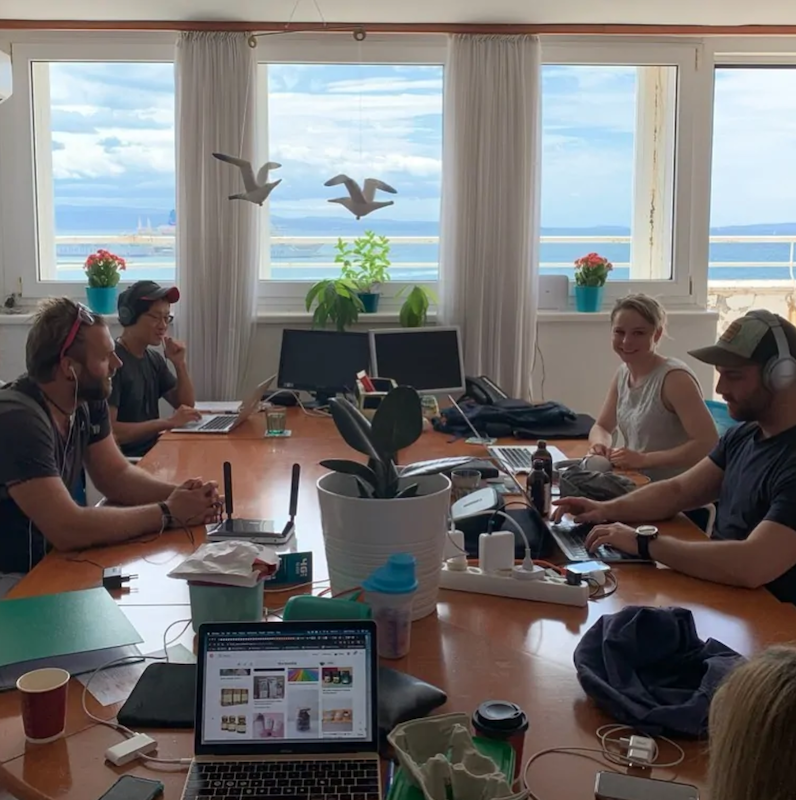
On the other hand, this environment is quite interesting for them because of their hospitality and security, especially for families with children, the health system has a good reputation, the climate is mild," says Tanja, who receives many inquiries about Croatian cities from digital nomads. The conditions they need to meet are proof of constant income, proof that they are digital nomads, that is, that they are not coming to Croatia to sell something but to do their job from this destination.
To help foreigners come to Croatia, a DNA association was established.
"The goal is to support digital nomads - as well as local businesses. The association deals with information, education, community networking, certification, and representation of digital nomads and various businesses before various Croatian institutions. Ways are being devised in which digital nomads can contribute to society, for example, around animal welfare or environmental protection.
It also focuses on tenancy topics because we know that many tenants and students are evicted from rented apartments when the tourist season begins. We will organize "certified" service providers so that digital nomads know that they will be protected," says Tanja Polegubić, believing that Split and Croatia have an excellent chance of becoming one of the favorite destinations of digital nomads if they open their hearts.
While Dubrovnik has gone the furthest in this regard, Split is also turning towards such modern trends. For example, the Split hotel "Marvie" offers affordable packages for long-term stays. As much as a 50 percent discount for stays of 28 days or longer, even in the middle of the summer season. Guests have at their disposal a separate co-working space with high-speed internet of 200 Mbps, a projector with a screen and a flipchart, which can simultaneously fit 7 people, ergonomic chairs, and everything that makes the stay more comfortable.
Namely, teleworking is a growing trend with exceptional economic potential, which is supported by predictions that by 2022 there will be more than 1.87 billion workers in the world whose work will take place online regardless of location. Therefore, "Marvie" is the first Croatian hotel to create an offer fully adapted to the needs of teleworkers.
Jan de Jong points out that digital nomads are an opportunity that we must not ignore. The main advantage for Croatia is year-round tourism and the arrival of highly paid workers who would not take jobs and spend their salaries in Croatia.
"Digital nomads and marketing are important for Croatia because they share their experiences, videos, and photos with their families, but also on social networks, which is free promotion. Since the introduction of visas, 33 of them have applied, and four have been approved, while the rest are being considered," he said.
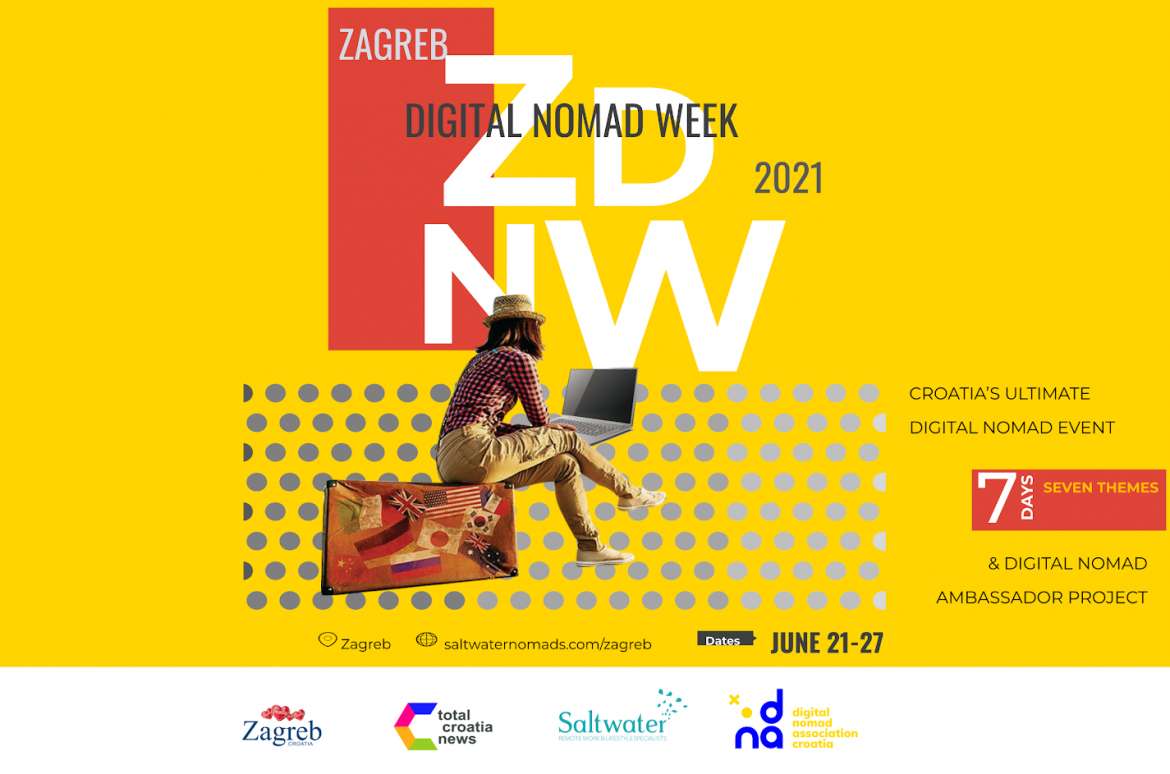
Learn more about Zagreb Digital Nomad Week 2021 Announced by Saltwater Nomads/Zagreb Tourist Board HERE.
Learn more about the Dubrovnik Digital Nomads-in-Residence program
Saltwater Nomads' Tanja Polegubic on Dubrovnik Digital Nomad-in-Residence Programme
Dubrovnik Mayor Mato Frankovic on Digital Nomads, US Flights, 2021 Season
For the latest on digital nomads in Croatia, follow the dedicated TCN section.
Vajt, Jan de Jong Win PR Grand PRix for Croatian Digital Nomad Permit
April 23, 2021 - Congratulations to PR agency Vajt and our favourite Dutchman Jan de Jong for winning the 2021 HUOJ International Grand Prix Award for PR in institutions, NGOs and associations for that Croatian digital nomad permit.
On May 2 last year, I received an email invitation to cover the SMART TOURISM 5.0 conference, which the email said was "the 1st virtual gathering of tourism professionals in Croatia."
I was not clear if I was being asked to speak as someone who is involved in tourism in Croatia, or to be the journalist covering the words of others. It turned out that the conference interest in me was to give them free PR with articles on TCN, and I politely declined.
I was curious to see who the speakers were, and I was surprised to see my good friend, Jan de Jong, as one of the speakers. A hugely successful businessman, I didn't know that he was also a tourism professional. I called him and we chatted. He was actually about to call me to ask my advice on tourism ahead of the conference. I sent him a few articles, including a couple on digital nomad tourism, a concept that was new to him and got him really interested.
Here is Jan, speaking at that first conference, on the potential of digital nomad tourism.
What happened next was truly phenomenal, as Jan, assisted by PR guru Jerko Trgorlic from Vajt, pushed through the digital nomad permit in record time. A truly outstanding effort, and a worthy winner of the 2021 International Grand PRix Awards in the category of PR in institutions, NGOs and associations.
In Jan's own words on LinkedIn:
What started as a dream, was followed by an unbelievable journey for everybody that was part of introducing a digital nomad staying permit in Croatia.
This regional Grand PRix Award is an amazing recognition for our efforts to help turn Croatia into a year-round destination for digital nomads from all around the world.
I would like to thank our Prime Minister, Andrej Plenkovic for the support he has given this initiation from the moment it got his attention.
Special thanks go to our State Secretary, Ms. Terezija Gras who was the driving force in bringing this staying permit to the finish line and who was the glue that held all involved ministries together.
Last but not least, a big thank you to the #LinkedIn community. Without your support this initiative would have failed before it even began.
Thank you Jerko Trogrlić and his team at VAJT d.o.o. for all your support. Its amazing to see how a small PR agency can deliver a big impact.
Hvala svima!
Love ❤
Jan
Congrats to Jan, Jerko and the team from Vajt. We are also following your tomato project with CROP Hrvatska very closely.
It was a good night for foreigners working to make Croatia a better place, as the Total Croatia Travel INFO Viber community also won a Grand PRix award in the category of crisis communication.
Jan de Jong: US Citizen Gets First Croatian Digital Nomad Visa
January 26, 2021 - Just over six months after an open letter to the Prime Minister on LinkedIn, a US citizen gets the first digital nomad visa in Croatia.
Foreigner of the Moment Jan de Jong took to LinkedIn once more this morning, exactly 199 days after writing an open letter to Croatian Prime Minister Andrej Plenkovic on July 11 last year, asking for a digital nomad visa for Croatia.
What happened next was remarkable for seasoned observers of Croatian bureaucracy - things actually started to happen.
Just 44 days later, Plenkovic tweeted a photo with de Jong, announcing that his government would push for the introduction of the visa, which would make Croatia only the second country in the world to offer it, after those very progressive Estonians.
Changes to the tax code and Aliens Act followed, and the legal framework was in place for a digital nomad visa for 12 months, as long as certain criteria were met.
While the visa was technically available from January 1, the final details and online application procedure were still a work in progress, with final delivery expected sometime in the first quarter of 2021.
And then this from de Jong earlier today:
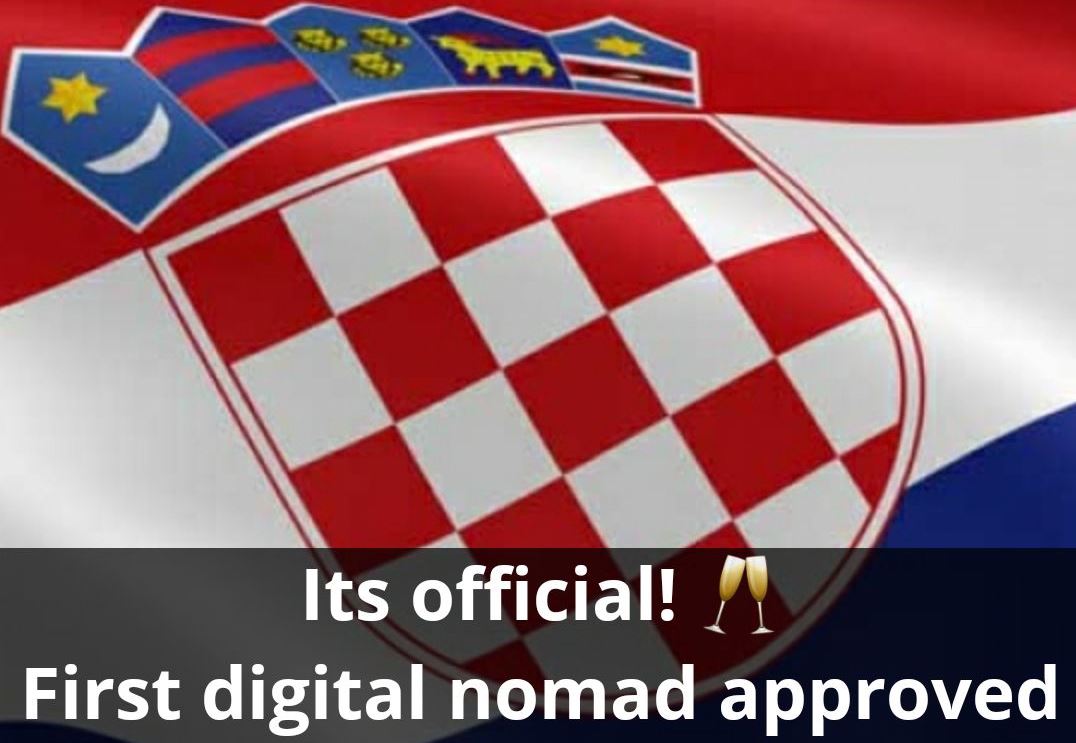
A glorious moment for Croatia ?? as the first #digitalnomad has been approved for his 12- month staying permit in #Croatia.
I know that the Ministry of Interior and Ministarstvo turizma i sporta / Ministry of Tourism and Sport are working on final details to start accepting online applications from digital nomads - and I am expecting this to go live in a matter of weeks from now
But as you can see - as of 01.01.2021. its possible to apply for the "digital nomad visa" (staying permit) at the local police stations all across the country.
Help share this positive event and may many more digital nomads find their temporary home in Croatia.
Thank you all so much for your support!
Poz,
Jan de Jong
Follow me on #LinkedIn for new updates.
#WFH
#Croatia
#LivingTheCroatianDream
I called Jan for a little more detail. It seems that the first successful applicant was an American citizen, who simply went to his local police station and applied and was successful in his application.
My understanding from Jan is that currently, proof of income is under the old rules, but that is expected to change in the coming week, with a proof of income of 16,000 kuna net a month the figure likely to pass.
More details as we get them of course, and while some may prefer to wait for the fuller picture and the online process, I know of several nomads wanting to apply immediately, with at least one planning on a visit to the local police station later this week. Given how new this procedure is, and the different level of responses in police stations around the country, I would expect there to be a little hit and miss in this process. But it doesn't hurt to try.
If any digital nomad is trying this approach and wants to share their experiences, please contact me on This email address is being protected from spambots. You need JavaScript enabled to view it. Subject Nomad Visa.
It all sounds like progress. Well done to Jan and all the others involved. For the latest updates, follow the dedicated TCN digital nomad section.
Croatian Digital Nomad Association Officially Founded (& Visa Update)
December 9, 2020 - As the digital nomad visa inches closer to reality, the Croatian Digital Nomad Association is founded. More on that, and a visa update.
It all started with an open letter on LinkedIn to the Prime Minister last than four months ago. 44 days later, PM Plenkovic tweeted his assent - his government would push for the introduction of a digital nomad visa for Croatia, which would make it only the fifth place in the world and the second in Europe after Estonia (Dubai and Iceland have since also announced nomad visas). And the word is getting out, with the Washington Post the latest global media to feature digital nomads in Croatia, including the Dubrovnik for Digital Nomads conference, which was recently co-organised by TCN, Saltwater, the City and Tourist Board of Dubrovnik.
Jan de Jong, the Split-based Dutch entrepreneur whose LinkedIn post in July started the whole process rolling, announced plans at the Dubrovnik conference to found a Croatian digital nomad association in order to help make Croatia a more attractive destination for nomads, by offering a range of services to help build and serve the nomad community.
The new Croatian Digital Nomad Association will have five key areas of focus, as explained in the infographic below.
De Jong took to LinkedIn once again this morning to announce that the Croatian Digital Nomad Association has been officially founded:
YES!! We have officially founded the Digital Nomad Association Croatia ??. Together we shall unite & serve digital nomads in Croatia.
It looks like Croatia will not only be among the first countries in the world to welcome digital nomads - but we shall also have among the most attractive visa programs currently out there.
Changing the laws in Croatia in order to welcome digital nomads was just the start of a great and exciting journey.
Croatia has a chance to position itself among top destinations globally. There is a lot of work ahead of us - both in the private & public sector. That is the reason why we wanted to organize ourselves in an association.
If you want to:
✅ Join the association
✅ Support the association
✅ Volunteer at the association
Then please, follow Digital Nomad Association Croatia on #LinkedIn as more updates will follow soon - stay tuned.
I would like to thank my co-founders Tanja Polegubic & Karmela Tancabel for their efforts and insight. Thank you Younited Agency for our visual identity.
Last but not least, thank you all for your support. We would not have come here without your comments and shares
Give this post a ❤ as your first action to support the Association!
Pozdrav,
Jan de Jong
#Croatia
#DigitalNomads
#Remotework
What is the latest with the Croatian digital nomad visa?
Apart from the many questions I get about the new rules for entering Croatia at the moment, the most common request for information I am getting these days is a progress report on the availability of the digital nomad visa. There has been a LOT of interest in the visa, with Croatia perfectly positioned to offer a great nomad lifestyle experience to visiting remote workers. There is also understandable frustration from the initial tweet from the Prime Minister back in late August, and the still-undefined terms of the visa or the timing of its availability.
Here's my take on the current situation and what and when I think might happen (PLEASE NOTE that this is just my personal observations only, and you should wait for official confirmation before making any firm decisions).
What we know for sure is that the legal framework is now in place for the digital nomad visa to be available from January 1, 2021, as a result of a change in the Aliens Act a couple of weeks ago, as previously reported on TCN.
What is still to be finalised (and various ministries are working on the final details, to be completed by the end of the month) are the exact conditions of the visa, details of which are yet to be announced. Here are some of the main
Who can apply for the digital nomad visa?
I would expect that anyone who has a bone fide remote business will be able to apply for the visa. Key restrictions on the visa would be that no business can be done in Croatia or with Croatian companies. This visa is for remote workers earning their money abroad and spending locally.
How much will it cost?
I have not yet heard a figure for the visa fee, but I would be very surprised if it was anything more than a nominal fee, or even free of charge. Barbados is charging US$2,000 for an individual, US$3,000, which defeats the point of what Croatia is trying to achieve. There is little point creating a product and then making it prohibitively expensive.
Will proof of a minimum income be necessary? If yes, how much?
As more and more countries are introducing digital nomad visas, it would be understandable to assume that the products are basically the same. They are not. Just as Barbados is charging US$2,000 for the visa, so too others have prohibitive minimum income requirements. Dubai requires a minimum of US$5,000 a month, Iceland more than US$7,000 a month. I have not heard a figure mentioned for Croatia yet, but I would expect it to be considerably lower, but high enough to ensure that those who do come have the spending power to help the Croatian economy. A figure of 1,500 - 2,500 euro a month minimum would make Croatia much more accessible, as well as providing a new generation of word of mouth promoters for the country's tourism.
What about tax payable in Croatia?
This is one of the big unknowns, and one which will be 100% certain next week. Will digital nomads have to pay tax in Croatia? My feeling is that the Croatian visa will come without a tax requirement to Croatia. These may seem strange to some people until you take a closer look at the realities of who might be using the visa. Perhaps the best example I can give to illustrate the point is the Russian/Ukrainian couple from Munich who I came across last year in Jelsa who truly opened my eyes to the possibilities.
They both worked in IT, and their Munich boss told them that he was happy for them to remote work 10 months of the year, as long as they were available online during Munich working hours. They could have stayed at home and enjoyed remote work in Munich, but they decided instead to rent out their apartment and spend the time travelling - 3 months in Jelsa, then to Sicily, Spain and Portugal. They came to Jelsa from April 1 - June 30, renting an apartment for three months out of the main season. So happy were they that they planned to return for the same dates this year. They ate in the restaurants, drank in the cafes, bought local in the markets, took Croatian classes. Income coming into local businesses in Croatia which would otherwise have been spent in Munich.
Multiply these remote workers and there is a slow effect not only on the Croatian economy but also on local businesses and communities. By making Croatia an attractive destination in terms of tax liabilities, visa cost, and minimum income, this is a real opportunity. The market will only get more competitive, as more visas are offered. It should be noted that my example above does not require a visa, as they are EU residents, but I wanted to give a concrete example based on the economic benefits, even with no tax liability.
KPMG Croatia has kindly agreed to provide a tax guide article for digital nomads in Croatia, which we will be publishing later in the month.
What about health insurance?
I would expect health insurance to be a prerequisite.
Criminal record?
I would expect proof of no criminal record to be a prerequisite.
How to apply for a Croatian digital nomad visa?
We are also still waiting for details of this. I would expect this to be an online process, devoid of the usual bureaucratic obstacles. The Ministry of the Interior did an outstanding job this year with its border control, and its Enter Croatia form was an unqualified hit. This is the ministry which is driving the introduction of the visa, and this is the ministry which really performed this year in dealing with border and tourist movement. It was impressive to watch.
How long will the application take to be approved? That I have no answer to.
Will the visa be available on January 1? While technically, it could be, whether or not the final pieces of the jigsaw are in place is not certain. But I think it is fairly certain that it will be available in the first quarter of next year.
We will post any updates on our dedicated digital nomad section, which you can follow here.
Croatian Digital Nomad Visa Closer as Parliament Changes Aliens Act
November 25, 2020 - Croatian bureaucracy 2.0, as changes to the Aliens Act to accommodate the Croatian digital nomad visa sail through Parliament. We are close, but not there yet.
Split-based Dutch entrepreneur Jan de Jong was back doing what he did so effectively back in July this afternoon, as he penned one more open letter to Prime Minister Andrej Plenkovic via his LinkedIn profile, this time a note of thanks.
Back in July, de Jong sent Plenkovic an open letter asking him to introduce a Croatian digital nomad visa. The response - during the summer holidays - was stunning. Just 44 days later, Plenkovic tweeted a photo with de Jong promising to do just that. By chance, changes to the Aliens Act were due to be introduced to Parliament the next day, and the nomad visa was added to those changes.
Those changes were today ratified by Parliament, leading de Jong to head to his keyboard once more:
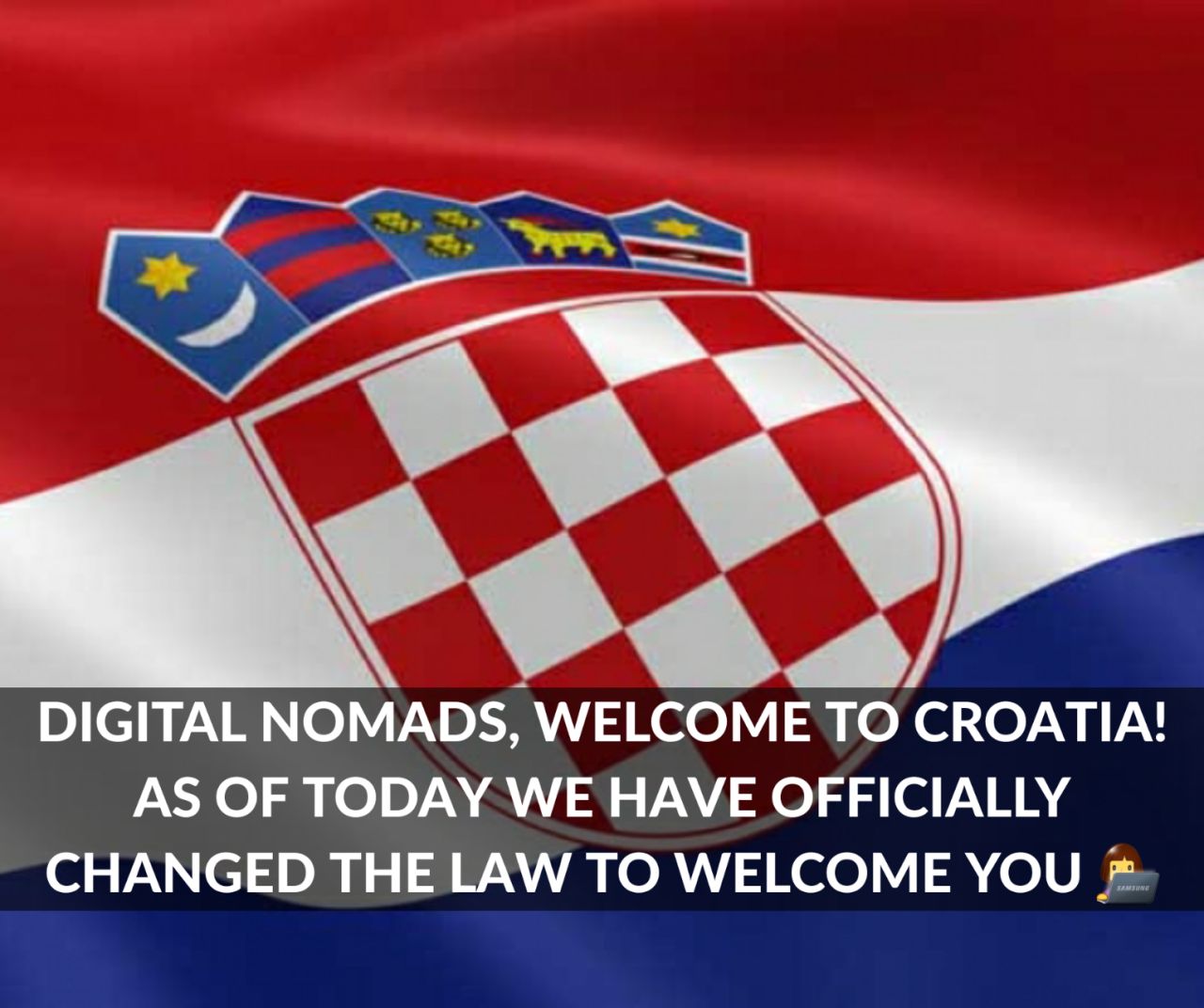
Dear Prime Minister Andrej Plenkovic,
On the 11th of July, I kindly asked you to consider introducing a digital nomad visa in Croatia ?? through my open letter here on LinkedIn.
Today, on 25th of November - with acceptance of the new Alien Act - you have truly delivered, making Croatia among the first countries in the world to welcome digital nomads by regulating their temporary stay.
Thank you Prime Minister for your support from the moment this opportunity was presented to you.
I would also like to thank Deputy Prime Minister & Minister of Interior - Mr. Božinović and State Secretary of Interior Ms. Terezija Gras for your efforts and support.
Last but not least, I would like to thank the 5.269 people here on LinkedIn that supported my open letter in July and all the thousands of other people that supported this initiative from the beginning.
Hvala svima! - ❤ -
Jan de Jong
Follow me on #LinkedIn
Ps. Required changes to tax law and health insurance are expected until 31.12.2020.
#wfh
#Croatia
#DigitalNomads
#livingthecroatiandream
So it would appear that Croatian bureaucracy CAN run rather smoothly.
My understanding from another source is that the issue of digital nomads and tax will be discussed during a government session tomorrow. The ministries involved are all making good progress, and the final issues are expected to be ironed out by the end of the year.
My understanding is that the changes approved today come into effect on January 1, 2021, so IN THEORY, the Croatian digital nomad visa could be available then. Experience in The Beautiful Croatia, however, has taught me to believe it when I see it, and I would be more confident in the prediction that sometime in the first quarter of 2021 is likely.
But if a motivated Prime Minister can move from a LinkedIn post to a change in the law in just over four months, who knows?

Not only is de Jong a successful entrepreneur, he is now rivalling his YouTube star wife Slavica as the family's top multitasker. When I called him for a quote and more info, he not only sent me a link to the parliament decision, but also screenshotted the relevant sections, all this without dropping the Baby de Jong he was holding.
Here is the full parliament decision - it is a riveting read. Google Translate is your friend. The relevant sections are in the screenshots below.
One more hurdle has been overcome. Congrats to all.
For the latest news on this and other digital nomad news in Croatia, follow the dedicated TCN section.
